#the other posts had more speculation of 'this is a hypothetical similarity' and stuff
Note
yo fam i read ur grifnut/rvbnut tags,,like just make a post, i want to reblog this
OOH u mean my tags on this post yea? i’ll just make it THIS POST 8))) i was just gonna screencap all them juicy tags but since rvbnut [best term ever thank u for that] is otp, i will retype for better readability + i thought of some extra things to throw in, so here we go:
as mentioned already, there’s donut’s super secret diary where donut describes"gazing silently into each other’s visors” and feeling a connection, as well has having sat in grif’s lap”. i very much believe donut had a crush on grif at some point
there’s some PSA or something that for the life of me I can’t remember the name of, and it might just be a dvd extra cause I found it on youtube not through the rvb channel, where the reds are getting on motorcycles to go somewhere and grif has to share w/donut, and hes Very Hesitant and i dont remember what exactly donut was saying but it was Very Suggestive how he was telling grif to get behind him and hold on tight or w/e, and when grif didnt wanna get on it with him he was like “whats wrong ;(?? dont be shy~”
ive pulled out my book now and donut describes the play they put on for tucker as being about “the band of handsome male survivors braving the elements together” so, donut thinks he + the other BGC members are handsome
“The first thing the doctor did when we got him back over to our base was pin Sarge against the wall with the Warthog. I always thought if anyone was going to ram Sarge up to the wall, it would be me, seeing as how I’ve been angling for a promotion lately” -another entry in donut’s diary. i honest to god have no idea how this could be taken as an innuendo, bc it straight up sounds like donut wants to fuck his way to the top
also in the book, simmons’ self insert fanfiction “Hero In Maroon” has… a special scene with “Donut the Enchanter,” who is “spreading his temptation magic through scandalous dancing.” This is SIMMONS writing this, and simmons has himself say “Tell me what you know about Sarge, else I will have to run you through with my long sword” and, sure, he has donut speak in innuendos and reply to that line with “I like where this is gong. Maybe I’ll keep you here… FOREVER!” but like, simmons literally wrote himself throwing an innuendo to donut. then you have the next few lines “DONUT USES OFFICER HOT PANTS HANDCUFF ATTACK” “”Oh no!” Simmons exclaims. A bed appears behind him. His hands are cuffed to it.” And while the next line is just donut laughing and saying “Now you must watch my rendition of the musical CATS” so while donut wasnt gonna do anything creepy, this really sounds like simmons writing a self insert fic that includes a provocative donut flirting with him while talking about musicals…. simmons dont repress ur crush on donut
^not to mention the officer hot pants comes from donut having dressed up and jumped out of a cake for sarge’s birthday……..
at the finale scene of s13, donut says “I love you, too, Lopez”
Donut lived offscreen with Doc in valhalla, and then was dropped back off there to continue living in valhalla with doc (and lopez’s head) (i could talk for 60 years about them but anyone who’s followed me long enough has heard it all before and i’m tryin to keep the points b r i e f lol)
church has said “I like donut. He’s pretty harmless, man. I-I don’t think he’d hurt a fly.” and upon finding out donut got crushed by a spaceship, he paused his snarking to say “Oh, wait, the pink guy? Oh, I actually liked him!” to which grif replies “Seriously, what’s with all these feelings for donut?”
tucker, thinking donut was a girl bc pink armor, asked donut if he “wanted to date one of us” and then called donut a “tease” when he said he wasn’t a girl
donut polished tucker’s codpiece 3 times when he and caboose were helping tucker get the black gunk off his armor, saying something along the lines of “a 3-coat waxing is just my way of saying I Care :)”
epsilon!tucker, while not canon to actual tucker, is implied to have jacked off to donut bc he thought he was a girl
seems to be implied that tucker and donut were both assigned to the same desert location when everyone got split up, and donut passed out from thirst/exhaustion trying to get tucker’s distress call to the others
in The Best Red vs Blue DVD Ever of All Time, there’s a scene where tucker and donut are introducing “best couple.” Donut goes on about romance, while tucker says couple doesn’t necessarily mean romance, and that “you[donut] think everything is romance! last week you called it romance when i accidentally took a bite of your sandwich” “was it really an accident tucker? was it?” “YES!” “time will tell” “ugh, whatever-” dudes, donut totally had a crush on tucker at least once
i dont have a good source but i remember seeing in a post a while back that there was a scrapped plotline that was gonna be a love triangle between donut, a “confused caboose”, and an unknown third party
i’m willing to bet the confused caboose bit is because caboose seems to have thought (and maybe still does? who knows) that donut was a girl, likely because of the armor. in caboose’s mind, donut’s a girl who says things like “I love caboose, and yet, I’m still afraid of him, he’s so scary :)” [cause he seems to think of himself as intimidating to the red team lol], and then in Head Canon, caboose!donut says something like “i like [something] almost as i like to paint my nails and not talk to boys. i would never talk to boys, especially not caboose for some reason!” which… is hard to make sense of tbh lol, but since everyone in caboose’s mind is how caboose perceives them, it maybe seems like caboose doesnt get as much of donut’s attention as he’d like?? lmfao, it sounds like “not caboose for some reason” means caboose doesn’t really understand either.
donut tearily said to caboose way back in KITBFF: “ Mister Caboose, I just want you to know that even though we are on different teams, and we may never see each other again, whatever happens out there today, I’ll always remember the moments we shared together. You are now, and forever will be… my friend.” very emotional if i do say so myself
there’s this reconstruction deleted scene where i guess donut had gotten transferred to doing special agent stuff w/wash’s division or something (wash calls him Special Agent Donut so, i guess lol). Wash speaks in donut innuendos the whole time he’s talkin about donut [”He’s a back door expert” “if there’s an unsecured rear entrance, he’s your man” “legend has it he can get through even the tightest cracks-” lmfao and they address each other by name, so i like to think they’ve worked together and donut’s… mannerisms… have been Rubbing Off on wash ;p
^also in that deleted scene caboose goes “DONUT! :D” when donut appears and talks, so he’s clearly excited to see him!!!!!!!!!
ahem. point being: the bgc needs to embrace the donut love and i firmly believe that if someone didnt have a crush on donut, donut had a crush on one of them at some point in time
#katanacupcake#look what u've done... you have... Enabled Me...#i'll never turn down a chance to yell about my Fave Red#franklin delano donut#rvb#im taggin him but not everyone else bc that's a Lot#hashtag all donut ships are canon lol#asks#lmfao i love simmons and grif just giving up 'hey donut...............' in that last thing#my faves... i love the reds#WHY CANT THEY ADMIT THEY LOVE DONUT TOO#bless church and caboose for not hiding their fondness for donut#ive talked longer and in depth for some others like church tucker and doc /donut#in other posts#i could find them but dsflkfsj this was more like#specific stuff#the other posts had more speculation of 'this is a hypothetical similarity' and stuff
150 notes
·
View notes
Text
pagan-soul replied to your post “My absolute HATRED for the term “Celtic Mythology” VS my desire for...”
Why do you hate that term? ��
So, I decided to give this its own post because I really feel like it does deserve it, since it’s the kind of thing that I think most people outside of the field don’t really think about and you deserve the best answer you can get, though I’m not sure how clear I’m being. If there’s a point that I’m not clear on, please ask me to clarify, since I can never tell if I’m being entirely coherent. I’m not sure if I can give you a FULL answer, since some of this is slightly outside my pay grade (given I don’t get paid, that isn’t hard), but I’ll try to do what I can.
For most of us in the field, I think, we generally hate it because it’s very, very imprecise and a little misleading. There really ISN’T a singular “Celtic Mythology”, just like there was never really a singular “Celtic people”. There were a vast variety of Celtic-speaking groups, spread as far out as modern-day Turkey, and each one of them had a unique cultural environment. Cernunnos, for example, does not have anything to do with, say, Bres mac Elathan or Rhiannon. And, in fact, in terms of the times that each one of them would have been popping up, there’s a SIGNIFICANT difference in ages.
(Taken from David Stifter’s Sengoidelc)

At some point, as you can see on the linguistic map.....during the Proto-Celtic period, they WOULD have had roughly the same cast of characters, BUT that is a time that we really know little to nothing about, and even then, I do believe there would have been localizations depending on family group and region. We can TRY to reconstruct it by comparing different figures/names and then putting them in an Indo-European context. If, for example, you see similar things pop up in India, Ireland, Greece, etc., you can be fairly certain that it is [1] A pre-Christian survival and [2] Specifically, a Proto-Indo European survival, aka going back to really some of the EARLIEST belief systems we have. If you have the same things popping up in Irish and Welsh contexts AND you have the name popping up in Gaulish inscriptions, we can be fairly certain that the figure is a REALLY old ass Celtic figure. Figures like Lugh, Ogma, and Nuada.....they are probably VERY old. Not that we won’t argue over it. Because Celticists argue over everything. (If you want to know about some of what Celticists have conjectured, I highly recommend Proinsias Mac Cana’s ironically-titled , given the topic of this post, book, “Celtic Mythology”. Now, some of what he said has been debated, because.....see above. Celticists. Arguing. We love it. BUT he’s a respected figure in the field, and my supervisor likes him so I’m legally required to like him too.)
WHICH brings us to our next problem, which is that the way that each figure developed. Lugh, in an Irish context, is not Lleu in a Welsh context. They probably share the same root figure, at some point in their shared history. Their names match up TOO PERFECTLY for them not to. But the way they developed was specifically in the cultural context of Wales/Ireland. Lugh in particular is a VERY malleable figure. You can read three works where Lugh is in and get a VERY different reading of him in each one. (Good king? Machiavellian schemer? Flawed pragmatist trying to unite a people who won’t be united? A figure who’s more a symbol of kingship than an actual CHARACTER? Depending on the source and the time/context, you can get any combination. For what it’s worth, in the Early Modern period, there is quite a bit of matieral that shows a darker side to Lugh.) Saying, “Yes, these two are related” SOUNDS like it’s admitting a lot, but in reality, that still doesn’t really tell us anything about this hypothetical figure. If you put a knife to my throat and made me GUESS, I would say that he had some connection to kingship and sovereignty. Possibly, in relationship to that, sacral kingship, given that both Lugh and Lleu are betrayed by a woman to their deaths. But that is HIGHLY speculative and again, doesn’t really SAY anything. Lugh is Lugh and Lleu is Lleu. It’d be like trying to say that, because you and your cousin come from the same grandma, you’re exactly the same. Now, you might be able to INTUIT certain things about your grandma from any common traits you and your cousin have, and that’s a valid line of inquiry, and it’s definitely one that plenty of solid Celticists have done, I am NOT denigrating their research, but you’re still you.
Finally, “Celtic Mythology” really is.....rather bombastic, as a term, for a group that almost always consists of Irish Mythology (and, sometimes, Irish folklore, which is VERY different from the mythological texts), with Medieval Welsh literature sprinkled in for a bit of flavor. (Even the term “Welsh Mythology” is controversial, simply because, really...it’s much harder to pick the MYTHOLOGY from the literature. Even harder than the Irish.) And, in the field, even saying “Celtic Studies” is something that we kind of do through gritted teeth because we don’t really have a better term for what we do. See that big-ass linguistic family tree up there? Yeah, I’m not too proud to admit that there are exactly two languages on there that I am in any way equipped to talk about: Middle Welsh and Old Irish. Now, an IDEAL Celticist, aka some of the best in the field, is a jack of all trades, someone who can talk about the linguistic evolution of at LEAST Old Irish and Welsh (including their modern descendants), with a solid background in Proto Indo European and the ability to at least comment on the various other Celtic languages. (There are some scholars who specialize in, say, Scottish Gaelic, Breton, Cornish, and Manx, but they are basically a niche in a niche. The field, as a WHOLE, is VERY much dominated by Irish, both modern and medieval. Which suits me very well, but does make me feel very bad for the other languages that get left out of the mix.) But that is a VERY small number of people in the field. Hell, I got met with basically crickets when I said that I wanted to study Breton, not because people didn’t WANT me to, but because the resources simply weren’t available, much less as an English speaker. (I still want to take it up, though.) I know of some professionals in the field who NEVER would call themselves a Celticist, simply because the term doesn’t really fit them. My paleography professor was, incidentally, one of them. Personally, I DO use it, because again, I don’t have another term.
But, and I can’t emphasize this enough, what I study isn’t a SINGULAR Celtic Mythology. What I study is Medieval Irish Literature, with a focus on the Mythological Cycle and, when needed, I can sometimes comment on the similarities to Welsh figures. I don’t LIKE it, because I feel like I can’t do the richness of the Welsh material justice, but I can do it if you put a knife to my throat. With stuff like, say, Gaulish Mythology....we can make very educated guesses based off of inscriptions and things that the Romans/Greeks said and comparing them to Irish/Welsh material, but we don’t really know. Can’t really know. And with others...there were no written materials during the medieval period, or at least none currently surviving. (This is why Old Irish and Middle Welsh to tend to dominate mythological discussion: The bulk of our medieval material does come from those sources. People can say all they want about the scribes who wrote down the Mythological Cycle, but the simple fact remains that, if it weren’t for them, we wouldn’t be studying these texts.)
For me, the term “Celtic Mythology” kind of lumps all the individual Celtic materials into one massive soup bowl, regardless of time, context, culture, or any other distinguishing features, and, most of the time, would be just as easily done by saying “Irish Mythology” or “Welsh Mythology”. There are very few times, unless you’re talking about the ENTIRE POSTULATED HISTORY of a figure, that “Celtic” is really needed and it tends to assume that Irish = “Celtic” (most of the time, I see posts where Irish, in particular, is treated as being the same as “Celtic”, and my ire in this instance is directed towards them) instead of admitting the full variety of what that term actually means. Irish IS a Celtic language, yes, absolutely, but it is not the be-all, end-all, and the two terms are not synonymous. “Celtic” is a very broad term that can only really be useful in a few contexts, mainly linguistic, and is insanely controversial in the field as it is.
On a religious perspective, since I know that this is inevitable in conversations like this, does this mean that I’m saying, going back to my original example, “No, you cannot worship Rhiannon, Bres, and Cernunnos at the same time?” No. I am VERY firm on my stance that I can only speak from the perspective of my knowledge of the field, NOT on other people’s belief systems. This is similar to if someone was to ask me about the function of a given postulated deity, where I can only say “The material as it was written down indicates x, y, or z, and most of us in the field are VERY hesitant to apply a solid function to these figures, but if you feel that this figure is guiding you to a given conclusion, that’s fine. It isn’t ‘inaccurate.’ I don’t believe that there’s any way for a religion to be ‘inaccurate' so long as it’s harming no one.” (Use Celtic Studies as a smokescreen for white supremacy and I WILL roll down your throat faster than a hot dog on the 4th of July, though.) If all three of them are calling you, that’s something that I have no call on. I personally think that it’s a HELL of a combination, and I’d wish you the best of luck, but....it would certainly be an interesting one. If you want to take the reconstructionist root and try to figure out how they would have been worshipped in the Proto-Celtic times, that’s fine (though I do strongly advise against human sacrifice.) You’d have a devil of a task, but it’s certainly a fine one, and in many ways, not too unlike what scholars like Mac Cana did. And, if you want to worship them as they appear in the texts or how they’re personally guiding you, that’s not something that I can make a call on one way or another. Again, this is about my own personal feelings, from inside the field, on the term and how it can be rather misleading.
141 notes
·
View notes
Note
so i just heard on twitter P5S had some development problems, thus the issues with the story, the lack of character development, and the switch performance. It would explain quite a bit, but I haven't really heard anything from legit sources. Did you ever see or hear anything about that?
I....I’ve been very sparse on Twitter today tbh. So I’m a bit behind. So I don’t know the tweet you’re referring to. ;w; orz
(oh boi, under the cut cause weeeeeeeeee 8U buckle up novel time)
If P5S had development problems with story/chars, that would’ve been with the JPN release. Which might explain why it started developing before P5R but released later (doesn’t help that Atlus apparently just signed off on the story rather than write it themselves >.> think that info in particular can be found on another personacentral article). But AtlusUSA isn’t involved with writing the story, just translating/localizing it.
Switch performance, I doubt AtlusUSA is the one who is in charge with fixing that too. If anyone is gonna patch that mess, that’s gonna be KT (hell not even AtlusJPN, cause KT is who developed it iirc). Now I DO know that AtlusJPN is working on a patch for having SMT3 run better but that’s not P5S sooooo 8U
Now my personal theory/theories about why P5S was taking so long was:
Covid
Covid
Covid
Localization rights (KT America vs AtlusUSA/AtlusWest, I’mma still use USA screw west sorry its one letter too long and I’m lazy >8U)
PS5
Swap PS5 out with Steam and there we go. Should’ve seen the hints before but yeah....we’ll get to that in a bit.
Covid really screwed a lot of things up, like REALLY REALLY. I don’t think I can stress this enough. It pushed back a lot of stuff because people couldn’t gather. Not just “in public” like literally at work. It took awhile for people to implement ways to still do their job (either by working from home, or having a small bubble). We know anime and dubbing got delayed because of that. Hell some games got delayed because of that too! So I cannot stress enough how much Covid screwed everything up. But how much did it screw everything up? Well......that’s when I decided to look at the past few games AtlusUSA had localized. The result was usually 5-7 months, that includes PQ2 which infamously didn’t have a dub (ah should’ve included SJR..... uhhhh oh same time, 6 months). Anyway I predicted August-November if they skirt the marketing, otherwise we’d get it early 2021. And a-yo wouldya look at that~!
Anyway that post was in July, by that time I think companies figured out how to safely gather for dubs. But keep in mind AtlusWest was also doing other translations beside english now so........yeah......people who say the dub is the reason for the delay, I don’t think that’s right (heck even in this case I don’t think it’s right). Considering that SJR/PQ2 both took about the same time, I have a feeling that AtlusJPN doesn’t want AtlusUSA to release their game until a set time (thankfully it seems that might be changing with SMTV tho!)
So we’ve addressed Covid, and my mini conspiracy of AtlusJPN forcing a later release date on western releases..... What about Localization rights? So.... ok, there was a post I wanted to make sometime around 2018 but never did. In around 2018 BBTAG was coming out right? So fun fact, at Acen I was there and lo and behold a rep from Arcsys was there showing off an arcade of BBTAG~! And not just any rep, a marketing rep iirc! Well let’s just say I had a few questions, as a fan I’m not a reporter fksjdkflja didn’t come in swinging with a recorder sorry (anyway the questions were something about VAs like getting old Kanji/Chie/Teddie back, changing Aigis’ name back to Aegis....iirc Teddie wasn’t out yet so yeah I’d ask why the wishy washy stance but ey didn’t know that info yet, if they’d be working on Arena 3 rather than AtlusUSA, yadda yadda). Well the thing that stood out was when I asked if Arcsys’ new western branch would be in charge of localizing this hypothetical Arena 3 or any other Persona Fighting game if made. And he said “yeah, if Arcsys JPN works on it, we’ll be localizing it!” Now, that was then this is now. Things change, it’s also a diff company compared to KT so things might be different. (btw Arcsys didn’t have a western branch with Arena/Ultimax so yeah obvie AtlusUSA did the localization). Or it could’ve been bad info. Or it could’ve been that-that was the case but it isn’t now. But here’s the thing, KT does have a western branch (that or google is lying), and IF, IF what Arcsys’ rep says applies here....then there might have been a dispute between two companies on who might localize it going on behind the scenes. Which might explain why AtlusUSA wasn’t talking about P5S cause....yeah....you don’t really talk about that stuff when it’s in dispute. >.> BUT that’s just a theory. 8U A SILLY THEORY! Thanks for-oh wait I have one more. 8U (but low key that could’ve been happening behind the scenes, so like I wouldn’t be surprised, but the next theory also makes sense why it was delayed so eh, could be both, could be one or the other doesn’t matter)
So the last theory I had was originally the PS5. So like, we didn’t know till very late that when the next gen consoles were coming out. :) Thanks Sony. :) And Microsoft. :) *cough* Anyway, so I thought maybe AtlusJPN wanted to do an update or something and might’ve been holding AtlusUSA back so they could do that because YEAH WHY NOT! ANYTHING GOES ATM! But....BUT..... after the leak.....it made sense. I wouldn’t be surprised if they held back because of.....Steam. sajdkfla Esp with those teases of other games coming to Steam....I can’t believe I didn’t see it kdljsaf It also makes a lot of sense timeline wise. So we know that CHN/KR got their own versions of P5S right? Yeah so those dropped around the time of P4G’s WW release on Steam (4-5 days after P4G iirc). Now, CHN/KR tranlsations are probably faster than the western releases for a number of reasons, similar cultures (so localizing isn’t as bad), and the languages are closer than their romance counterpart so it’s probably easier translating too (they also don’t have to dub but as SJR/PQ2 have shown that’s a non issue). But here’s the thing, AtlusJPN wasn’t expecting such a success on Steam....and then it happened. So that leads me to believe that they probs got to work right away on a Steam release (or at least got more serious about it). And now all of it is probably basically done (translating, dubbing, Steamming, yadda yadda), now they just have to market it, and VGA is the best time this late in the year.
*inhales* So yeah, that’s my theory on what happened. Again, it’s a theory, all speculation from info I have available. Not saying any of it is true, it’s just what sounds plausible.
3 notes
·
View notes
Text

(Good lord, episode 7.
Let me just say that it’s pretty crazy that we’re already half-way through the season now? It’s almost overrrrr.
But moving on from that, this episode starts out with Millaarc and Elsa forcing Elfnein to activate what they needed in terms of using Carol’s body.
I’m still really confused on what Millaarc’s ability does and it frustrates me because I feel stupid. Lol. I know it’s clearly mental and dealing with the mind, but it seems like it’s used in so many different ways now that I don’t even know how to explain it.
Regardless, she tries doing this again with Elfnein to destroy her mind. However, Carol literally bursts out of nowhere to stop her.
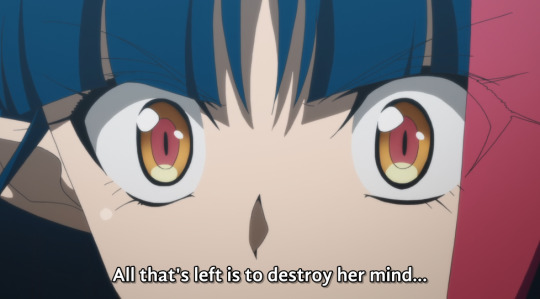
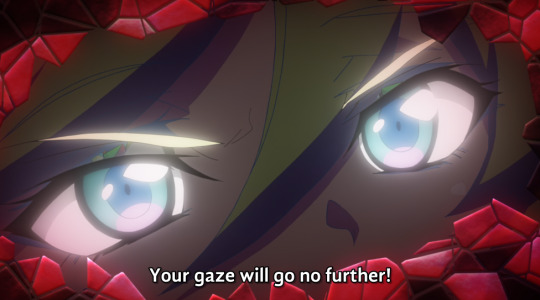
Now, I originally had a feeling that Carol would make an appearance not only because of where they were, but the summary itself, the top half of it specifically. The portion for the episode I mean is this:
If that which was sworn to be slain is put to words, erase them by plucking the strings from beyond zeros and ones. Discarded as unnecessary and unworthy, echoes of memories once lost linger here.
The “memory” mention is a pretty clear indicator to Carol, as they’re within the Chateau, Elfnein has been trying to reach back out to Carol now that they share the same body, and because Carol’s whole deal was dealing with memories. But what also stood out was the mention of “zeros and ones”.
Carol actually mentions “zeroes and ones” in her battle song (Senkin Dur da Bla) back in GX;
Nothingness is the only peaceful paradise
What can I do but believe in that?
I’ll expose and extol the providence of all creation
With my music enshrined in 0s and 1s
So that just felt like a huge hint there too in that she’d make a reappearance somehow. I just wasn’t expecting it that early in the episode...nor did I expect the end, haha. I love Carol.
But regardless, this stops Millaarc immediately, and seems to end up hurting her briefly in the process.

Also, I was surprised that Miku wasn’t the cocoon thing. I thought she was, since that was what happened to Hibiki, but I guess the divine power didn’t actually go within Miku. Instead, it began to somehow manifest itself instead, thanks to her I suppose?
So, Tsubasa, Hibiki, Kirika and Shirabe go and engage in a fight with the strange deity with Chris and Maria trying to make their way there. But it’s a multi-dimensional being, just like the one in AXZ that I can never fully properly spell the name of.
And what stopped it last time was Hibiki and the so called “god-killer” ability, so that’s what she does. But the odd thing about it is that after Hibiki saves Kirika, she was caught in it. HQ says that it begins focusing energy on her instead, which I assume it was overloading her? But I’m not sure in which way.
Regardless, it’s enough to take Hibiki completely out of the fight, forcing Tsubasa to suggest they all retreat.
This thing looks so gross, haha. It’s like a giant, big headed...baby thing.
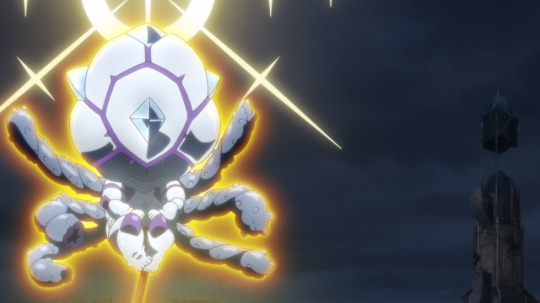
But anyway, they say Hibiki’s injuries are far more severe than they seem but no other details than that. Not sure how that is though but suppose we have to wait and see.
Also, Tsubasa’s smile was one of the preview pics for this episode and honestly, it was nice to see her smile...but I was worried about the context.
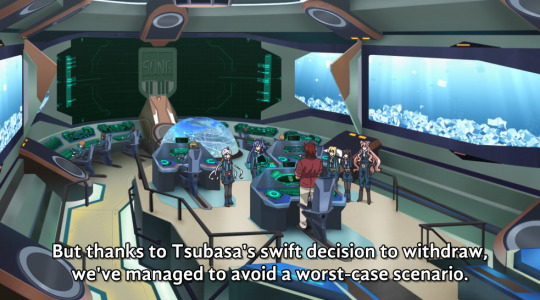
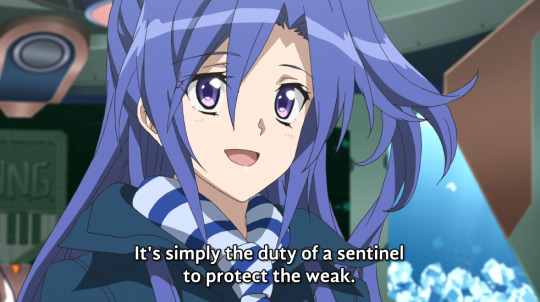

Something about her smile and comment just feels so off to me. Clearly she’s still not okay, and even Genjurou was surprised by her comment, so this doesn’t mean she’s better. No one knows that Tsubasa is dealing with that whole “seal” thing and we don’t even know how to break it so...I’m just not sure about it haha.
I talked to a friend saying that maybe she’s desperate for some good news or someone telling her she did a good deed? Or she’s trying to think of what Kanade would do? It’s hard for me to explain my feelings on this without making any sense.
After this, everyone on the bridge finally hears the ‘Apple’ song by rearranging the melody that Shem-Ha plays thanks to an idea that Maria had.
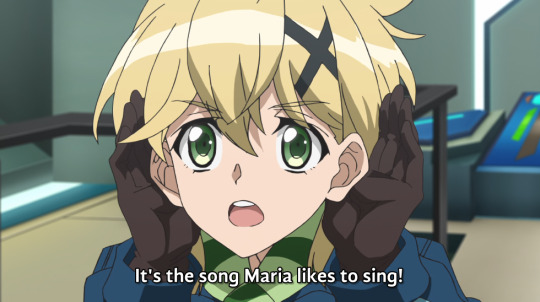
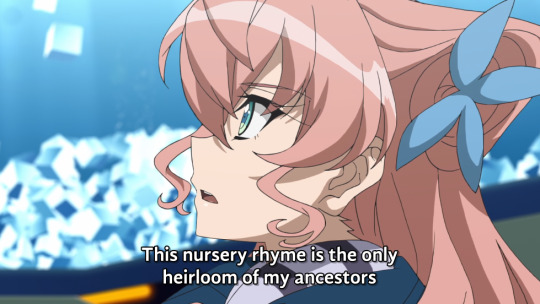
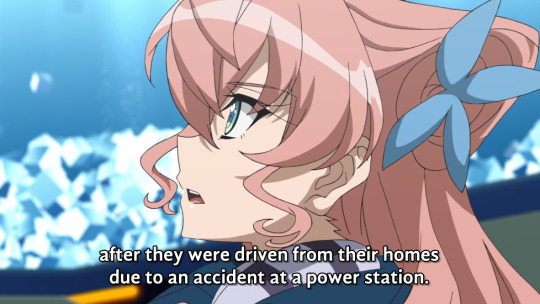
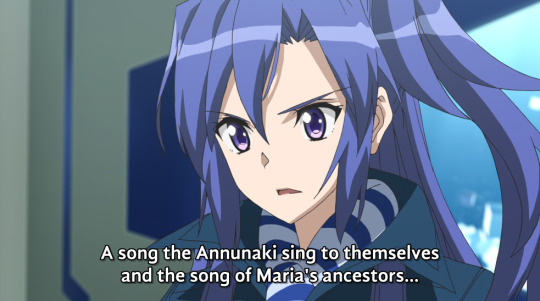
Maria makes reference to the Chernobyl disaster in Ukraine, as that’s where she and Serena are from, which happened in 1986. It’s been officially stated (or at least shown in the second episode of XV) that the show currently takes place in the year 2044. Maria is currently 22, so that makes her born in the year 2022.
So saying that her ancestors have a similar song can hint to a lot, just like how Tsubasa’s comment leads to. Maria (and Serena) very well may be a descendant of the Annunaki/Custodians, or has a connection with them somehow. Now it’s just speculation but still, it has to mean something. They’ve been alluding to Airgetlam and ‘Apple’ ever since the second episode (at least the song they have) so I mean...it’s slowly but surely getting there. Lol.
Plus it was a massive trigger to bring the world together in song way back in G for them to get enough phonic gain to achieve their X-Drives back then.
After this, Hibiki has a brief dream about the conversation her and Miku had in the first episode. I never did talk about the first episode but this conversation was just throwing a whole bunch of red flags from the get-go. Miku posing the question if she was a burden on someone else, would Hibiki stop her but then turns around and jokes saying that it was a hypothetical question.
Of course I still think she meant this as her fear of being a burden on Hibiki (aka Miku’s guilt) but again, this seems like a re-imagining of that conversation.
It’s different in the fact that Miku says that if she’s ever a burden, that she wants Hibiki to stop her, that she’s the only one who can. Hibiki, throughout this whole exchange, is actually really confused while Miku continues on saying that she’s the only one that she “trusts with all I have”. And it ends there. I can see this being a possible dream of Hibiki where she’s re-imagining the scene but replacing it with the details she knows now, or kind of like her fears slipping in?
But then I saw someone else pose a possible idea of her and Miku actually communicating through the same dream since they’re both knocked tf out right now. Not sure which one is true enough but it very well could be Hibiki having a dream.
Okay, this second half of the episode is just pure gold for Elfnein. It’s a lot of little things that stood out to me too, not even just the big reveal at the end. Here’s one:
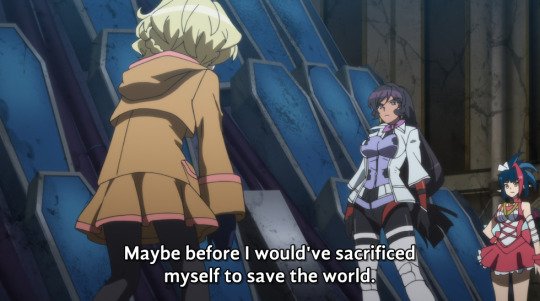
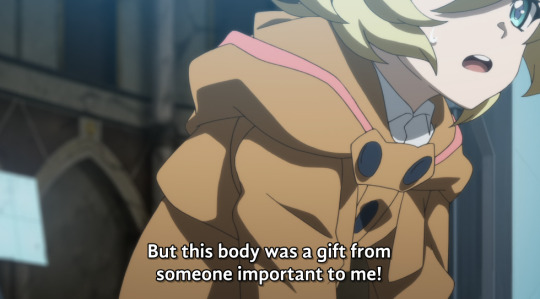
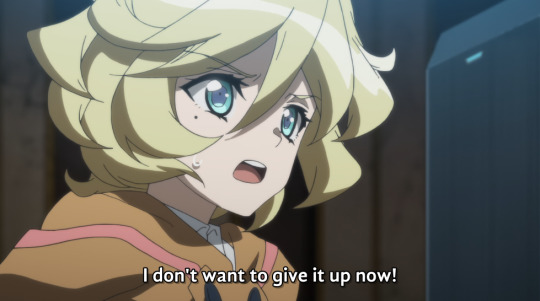
Elfnein gaining self-worth in herself ever since the end of GX. Elfnein, in her own way, has gotten so much stronger over the seasons and this whole half showcases that I think. But she’s stuck between Vanessa and co. since they’re trying to kill her. But the second she calls out for help---
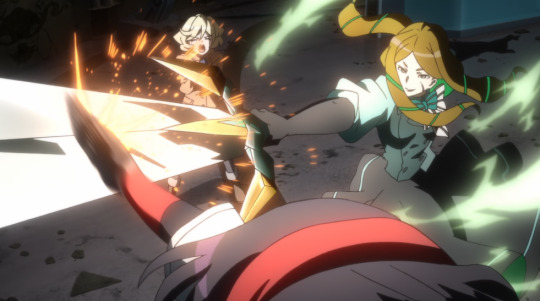
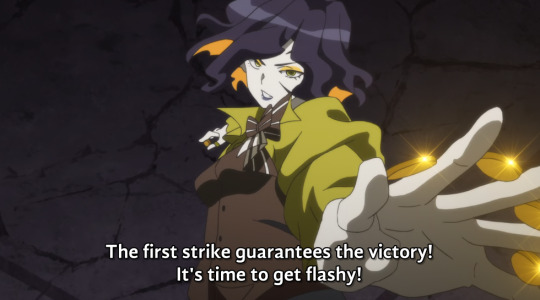
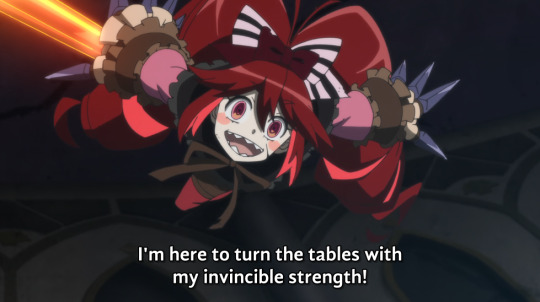
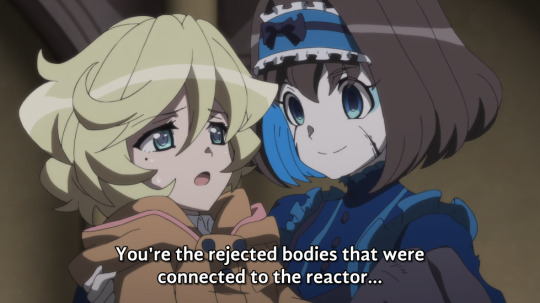
THE PREVIOUS AUTOSCORERS COME BACK. I swear, I didn’t see this coming. Like, at all. I actually really enjoyed them back in GX, I found them to be interesting, even with their limited time on screen. The OVAs build on them more but I still felt there was enough there for them to be interesting and for us to get a feel on their dynamics together.
The next thing that’s great for Elfnein:
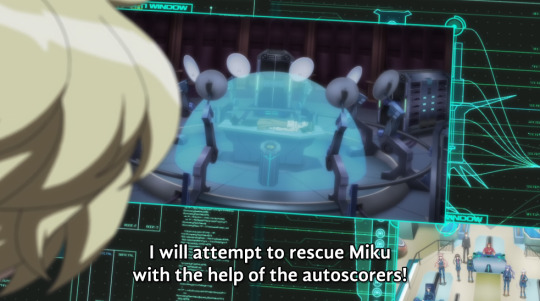
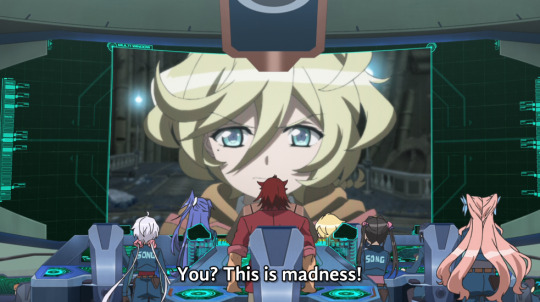
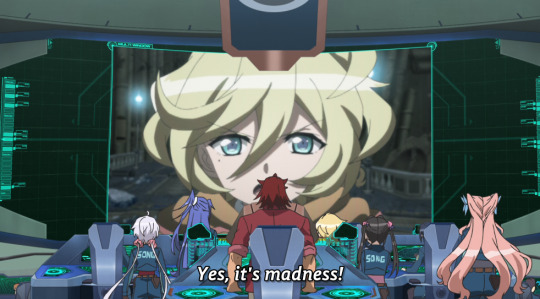
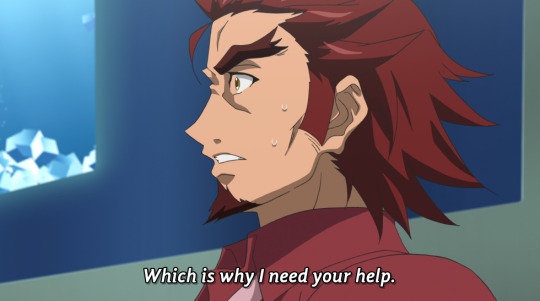
Elfnein being assertive. She decides trying to fight back and rescue Miku instead. It was strong enough to surprise Genjurou so I mean lmao.
Then another thing for Elfnein as a character. Noble Red catches up to them, so Phara and Leiur stay behind to slow them down while Micha and Garie lead Elfnein away.
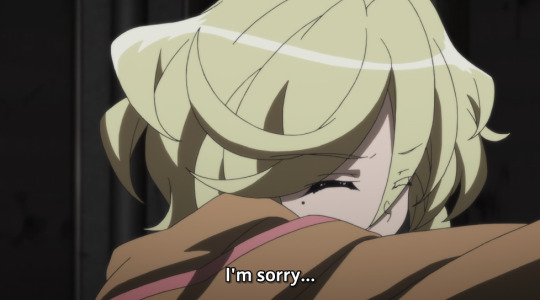
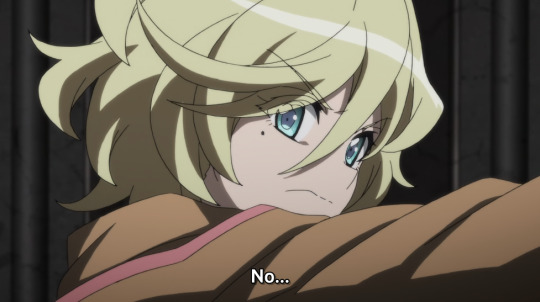
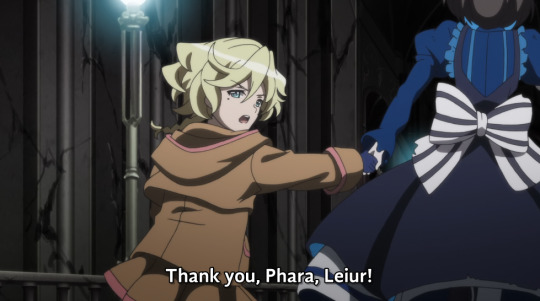
Instead of apologizing, she chooses to say thank you instead. It’s something simple like that that shows how much Elfnein has grown too.
The next one is a comment that Micha makes. In the OVAs, Micha makes a comment of how it’s hard for her to hold hands with people due to her claws. She speaks about how she’s the “ultimate autoscorer” but she needs the help of Garie to literally do everything for her; collecting memories, holding hands, and even tying her ribbon.
So she was slightly bummed that she couldn’t help escort Elfnein away like Garie could because her hands were too big.
But Elfnein tells her that she thinks her hands are “really cool” and she loves them. That gave Micha motivation to keep on fighting and made her happy. It was just something so simple and small that was really really sweet, especially knowing how Micha felt about her hands.
Noble Red catches up though, and defeats all of them easily. Garie was the last one to help Elfnein get away. And now that she’s alone, Elfnein is faced with the fact that everyone has helped her, but she wants to figure out a way to help them too.
She wants to repay everyone back for their help and kindness but didn’t know how. And so, faced with an incoming attack from Vanessa, she ends up doing this:
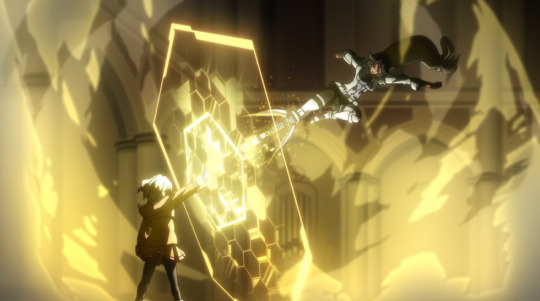
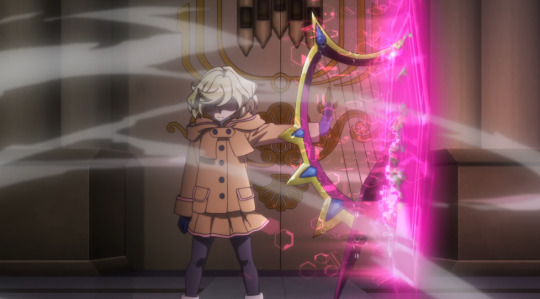
She freaking summons the relic Dur da Bla and basically...Carol comes back. AND has a new song. Song is called “Echo of Sforzato”.
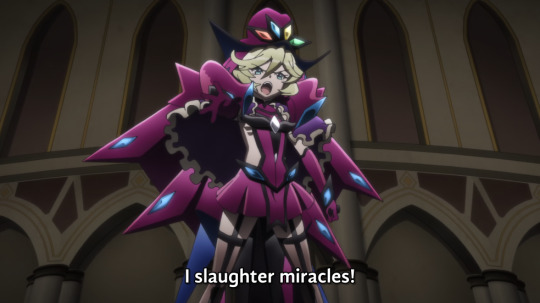
I was over the moon when this happened, haha. I couldn’t believe they’d actually have Carol come back in such a way? Again, the beginning is the only think I thought we’d get. But this? Good lord. It’s hard to explain my emotions about this episode because it was sooooo good for Elfnein especially in terms of character, same for the autoscorers. It touched on previous things about them in the OVAs, and added more to it, even if they only had small and limited cameos.
Also, one neat thing about the transformation Carol/Elfnein has is that in her hat, it shows the reflections of Leiur, Phara, Garie and Micha. The colors represented them before but the thing about it is that if you freeze frame the scene, it shows them making poses exactly like their “enemies” GX CD covers.
Luckily someone made a picture of them all on twitter so I can paste them here haha.


There’s two because Micha is the only one that changes twice for both Shirabe and Kirika. This part isn’t even a second long, it zooms by SUPER fast, but the detail in it is amazing.
It’s just a REALLY nice callback that they probably didn’t even have to add in. Plus there’s some other cool “behind the scene” things they posted on twitter (official staff) that even other stuff they made was meant to reference past CD albums (Like Leiur and her “big sister” version of herself was to reference the GX concert cover with Maria and Tsubasa).
Regardless, yeah this episode was great with the callbacks and references. I enjoyed it and got emotional over it. It turned out to be a great episode for Elfnein as a character honestly, which isn’t what I expected but glad it happened. ♥)
#ooc#(pure madness; it's like my computer refuses to let me make these posts haha)#(replies tomorrow though! I'm sorry!)
4 notes
·
View notes
Text
Protocols: Duty, Despair and Decentralisation transcript - Matt Dryhurst
https://medium.com/@matdryhurst/protocols-duty-despair-and-decentralisation-transcript-69acac62c8ea
No-one is going to pay for music anymore sufficient to keep scenes as we know them going. At least not in the ways many have been used to. So while some artists might make petty change from digital sales through Bandcamp, my assumption is that those figures will dwindle over time as streaming establishes greater supremacy. My assumption is also that whichever streaming platform wins (as all roads lead to monopoly in this current paradigm), the artists that benefit from that streaming platform will be those that most dutifully satisfy the requirements of the streaming platform, which I think is a very different aspiration than satisfying the requirements of feeding healthy international and local music scenes. When Daniel Ek says he wants “one million artists to live from their work”, I think of one million musicians, sitting in flat shares, stocking playlists for people to shower to. Music from nowhere, for no-one in particular. A far cry from a healthy, or interesting, music community that people in attendance today might care about.
My other assumption is that Spotify won’t succeed. If I were Google, or Apple, or Amazon, I would look at Spotify’s immense burn rate: “they posted an operating loss of $461 million on revenue of nearly $5 billion last year”, and bide my time. From where I stand, Spotify is spending immense amounts of money to reorder the way music works as we know it. They might well eradicate the traditional label and publishing model, by finding new ways for artists to post directly to their platform, locking them into new forms of agreements over their work that also indemnifies them, or any prospective parent company, from legal action over copyright infringing material that might be hosted on their servers. Soundcloud is trying to do something similar with their new agreements, and in lieu of a viable business model appearing, all I read from that is that these are moves to leave the door open to potential acquisition by a bigger fish
I don’t think there will be a streaming competitor to Spotify, or whoever might acquire them. Our best bet is to drastically reconsider the value proposition of music. What do people value and what are they prepared to support?
the club music economy is resilient in ways that other scene economies are not.
Club music, on the contrary, is very much based on location and loyalty, and is more generalised and functional. People go to dance, and are often less concerned with who is playing than what they are playing.
The functional underpinnings of most club music are also compatible with the functional expectations of streaming, as both require a fast and steady stream of somewhat anonymous compositions that transition seamlessly into one another. Music to work to. Music to play to. Seamless. This is all well and good, but again we are left asking, what about those musicians who don’t want to tailor their output to a predetermined function?
One of the significant battles we face at the moment is a war between music from nowhere, and music from somewhere. Music designed for instantaneous engagement, and instantaneous dismissal, and music that communicates with an archive.
The role of the critic has been under threat some for time, and will continue to lose influence to algorithmic populism, and the kindof process-hack algorithmic manipulation that makes stars on Instagram and Youtube. Spotify and Apple are already hiring journalists to cover the work they promote on their platform, so we will see more hagiographical journalism feeding that system, and the traditional idea of the critic as arbiter of taste, and gatekeeper of the archive, will continue to be eroded. Other gatekeepers, such as labels and niche festivals, will continue to lose prominence over time unless they radically reconsider their value propositions. The end of history? Nope, but the end of an era for sure.
The recent announcement that Conde Nast intends to paywall all of it’s publications, presumably including Pitchfork, by 2020 is interesting news. Exclusivity like this might work for the cream of publications, and also might perhaps trigger a snow ball of similar subscription plays by smaller publications. I like it when people pay for things, and we will see how that experiment plays out, but once paywalled, what we understand as the archive might well end up being housed behind those walls. Better that than disappearing altogether, perhaps.
RBMA and Boiler Room have been busy creating maps of culture. Maps are valuable, as they allow for the establishment of trade routes. On the one hand, RBMA and Boiler Room are doing a great job, as their models are predicated on the primacy of the kind of cultures that are under threat by the algorithmic populism of say, a Spotify or a Youtube.
Contrary to the hackneyed divisions that linger from the past, there really is no “mainstream” or “underground” in this new economy. Under ad-driven platform capitalism, there are either fertile pathways to sell people stuff, or barren and quantified pathways to sell people stuff. It’s a map. I’ve said a million times, in this economy, unique niches (or unexplored corners) are highly valuable. If you are an artist whose practice speaks to a unique intersection, say based on genre, identity, or personal narrative, then you are an interesting proposition to advertisers, as you are prospectively establishing new territory to sell people stuff. Brands, as patrons, want you to establish new territory on their behalf, and be first to that party.
So, for example, if now millions of people have the tools to create good-enough-Jeff-Mills-derivative techno tracks, it only makes sense that the distinguishing logic that someone might use to opt to support producer X over producer Y would heavily focus on tangential narrative elements. So much so that these narrative elements become the main source of value when competing with art of similar formal characteristics. Those tangential elements are perhaps better understood as metadata; equally optimal for growing new audiences and courting the interest of brands looking to achieve visibility in new niche markets.
The original indie pioneers did a great service to music, but let’s be real, have left us all an impossible legacy to continue. Record sales = money in the bank = options. Period. Options to say no. Options to do wild, and risky things. Who has those options today? Where would the money come from?
So the original indies, as far as I can tell, were predicated on two firm principles:
1.The majors were corrupt, strong armed bad music into the popular spotlight, and ignored radical new developments in music creation and localised scenes that needed to be represented.
2.On the other hand, being independent meant doing what you wanted, however you wanted it, with no-one above you influencing your creative decisions. Self sufficiency basically. People who colluded with brands were considered sell-outs as they had to tame their vision to appeal to a wider audience and secure that funding.
I know of more people who cite concerns about the gentrifying effects of transnational cultural institutions spending money across the globe, but lets be honest, indie music scenes of socially mobile young artists were doing just fine at gentrifying neighbourhoods before brand money got involved.
So, in the vast vast majority of cases, what is the inconsistency here? Warp, or Dischord, or 4AD, or whatever, aren’t communist enterprises. They aren’t radical free culture enterprises. No. They are and were, for better or worse, entities that made great strides to support the individual visions of unique artists, and helped them to gain prominence in the market for music, and for a period of time symbiotically reaped the rewards from sales of that work.
I think that in many ways, the foundational logic of independent music won. Now large portions of the economy are predicated on the promise of individualist independence. Everyone is free to self publish their unique perspective, and hypothetically find an audience for it online. That being said, we hardly live in a utopia as a result.
It is no secret that many of the original indies were founded by the wealthy, or in many cases by middle class entrepreneurs who could afford to dedicate their 20s to a speculative cultural business.
Equal ability to publish something means nothing when only those with the ability to fund promotion of the work are discovered. I’ve said it before, there will be an abundance of free culture, and free time, in the slums. Amazon can produce your product cheaper than you can, and strong arm you out of business unless you work with them. Facebook can acquire any competitor before they become dangerous. Pop music can appropriate and spit out your micro-scene before it has any ability to generate its own momentum, or it’s own funds.
In 2019 we all work for Kanye, only some of us figured out how to get paid for it.
So in the absence of the ability to accrue a foundation of wealth and stability for new music, independent artists who gained prominence via the centralised media channels of the 80s and 90s will reign supreme over the long tail of precarious younger artists until the day they choose to call it quits. The gravitational pull of those artists who established the categories by which playlists, and festival line ups, must orient themselves to reach enough people, dictates that most new music emerging needs to flatter the formal and conceptual foundations of those pioneers.
There is going to be a whole lot more music that flatters the impressive legacies of Aphex Twin, Bjork, Timbaland, Missy Elliott, Aaliyah, Jeff Mills etc as those are the kind of petrified shapes of envelope-pushing music from just before when the volcano of Web 2.0 went off 🌋 .Radical musical culture circa-1996 preserved forever, like the ruins of Pompeii - or as I believe Mark Fisher (or Simon Reynolds, or both??) referred to it, a kind of permanent 1990s.
Well on the one hand, the platform monopolies like Spotify and Youtube are going to continually erode your influence with every new person that comes online. Their algorithms will direct traffic away from your priorities, and towards theirs, and to survive in that ecosystem you will need to satisfy their agenda. Doesn’t sound too independent does it? Journalists will have to write more about what Spotify prioritises. Artists will have to make work to satisfy the debased formal requirements of those platforms. Labels will be shoo-ed off like annoying pests that are messing with the platforms long term vision. Really bad, and a great reason to be really angry at that particular logic of culture.
If your previous raison d’être was to support marginal communities, and weird music, you are probably going to end up being out competed by their models. Models that manage to leverage brand money to support those communities will grow and grow in prominence. The thing is, if you are playing exactly the same game, and one entity found a model to support exactly the same thing that you have supported traditionally, but more effectively, then you are probably going to lose that game. It sucks, but that’s what is likely going to happen.
I think the ‘cultural cartography’ model discussed before is quite precarious, as of course they too need for new and diverse things to actually be happening on the ground in order to maintain the model that they have built. Companies dependent on brand money are always a few emails away from being out of favour. State supported festivals are very fragile to that possibility too. As the popular narrative that Spotify is ‘solving the problem’ of music proliferates further, it is going to become increasingly difficult for people to convince brands, or an increasingly conservative state, that these niche pockets of music we might care about are worth the investment. Stat-supported music, if unimpeded, will come into direct conflict with state supported music.
So I actually think it is in everyone’s interests for new models to emerge.
I think some of those models can be complimentary to the institutions we have today, and some can be wholly antagonistic, and ideally we would see both come to prominence in the next few years for the health of scene development across the board.
As I said before, one reason I see things going south for competitors to the brand-aligned organisations is that they are competitive. You solve this problem quite easily by becoming uncompetitive, and doing something they can’t or won’t do.
One thing brands or their intermediaries can’t do, for example, is distribute ownership under a cooperative model. They literally can’t. But there are all kinds of reasons why that might make sense for various different cultural scenes or organisations.
Co-operativising creates loyalty and an alignment of interests between an organisation, festival, artists and audience.
Co-operativising allows for collective strategising towards common objectives. Rather than funds being ingested to the benefit of one artist, in competition with another, those same funds can be channeled into infrastructure that helps everybody and keeps the culture afloat.
So what of decentralization? To explain what decentralisation is, I’m going to borrow from Ethereum founder Vitalik Buterin’s model, which is focussed on technical infrastructure but has application beyond that.
He breaks decentralisation into 3 groups:
Architectural (de)centralization — how many physical computers is a system made up of? How many of those computers can it tolerate breaking down at any single time?
Political (de)centralization — how many individuals or organizations ultimately control the computers that the system is made up of?
Logical (de)centralization — do the interfaces and data structures that the system presents and maintains look more like a single monolithic object, or an amorphous swarm? One simple heuristic is: if you cut the system in half, including both providers and users, will both halves continue to fully operate as independent units?
Benefits of decentralisation in the context of music:
1) the network/archive is hard to take down. If Soundcloud fails, what happens to all that music, and the activity around it? If a magazine goes down, what happens to all of that history?
Decentralised, nodal systems like blockchains, or torrent networks, are resilient both architecturally and logically. You can’t cut the head off them. It took the state to take down What.cd for example, such was its resiliency.
Projects like IPFS propose a peer-to-peer immutable web, a web that can never be taken down, fortified by a nodal structure not dissimilar to torrent seeding.
2) regarding political decentralisation, this can be approached by entertaining ideas of common ownership. Rather than a centralised team at Spotify, or Youtube, making decisions that determine how your artwork is distributed, or the logics by which some work is made more visible, and prioritised over other work, politically decentralised networks entertain the possibility of pluralistic and democratic decision making.
3) Decentralised networks, when dealing with an open source code base, also allow for forking. If you don’t the way things work, you are encouraged to take the code and build something that disagrees with it. Over time what this mechanism creates is a healthy competition of ideas, and participant choice.
1 note
·
View note
Text
Cory Doctorow on technological immortality, the transporter problem, and fast-moving futures
Tasha Robinson, The Verge:
Walkway feels timely in terms of present politics and sociology, but the technology is more theoretical. How much of this future do you consider plausible?
Oh, the technology is the most hand-wavey stuff in the book. It’s probably easier to identify the stuff that’s least plausible, like consciousness uploading. If our consciousness isn’t inextricably tied to our bodies, we have no good way to know that, apart from wishful thinking. That sort of thing should always be looked at suspiciously as a metaphor, and not as a prediction. When we were making steam engines, we were all sure we could make a steam-powered brain. We had a lot of other different versions of this in fiction at different times — it always turns out by this amazing coincidence, we think whatever technology we use every day is the best way to understand our own cognition. The most common technology of the day is definitely the thing that is most like our brains, rather than something coming up in the future. So I’m deeply, deeply skeptical of the idea that our brains are things that we’ll put in computers.
But we do live a lot of our lives in the digital realm. We project our minds into the digital world. So as a metaphor for understanding who we are and how we relate to other people, consciousness uploading is a useful metaphor. Machine-learning-based vision systems are getting better at recognizing objects. Like a lot of fast-growing things, we don’t know if it’s on an S-curve or a J-curve. Is it going through a burst of productivity that will reach an actual limit and then taper off, or are we in some crazy exponential curve that will just go up and up, with machine learning getting better and better, and delivering more and more dividends? We can’t answer, because a lot of what we’re getting out of machine learning right now is incremental, but some of it is breakthroughs. It’s got that sexiness factor, where a bunch of people who would have historically not given a shit about machine learning are suddenly looking really closely at it, discovering easy wins that were invisible to earlier practitioners. Maybe there will be all new kinds of amazing discoveries.
Other things in Walkaway… All of the biotech stuff, like turning urine back into beer, that feels like something within the realm of CRISPR hackers. It’s something they might attempt, though maybe not pull off to the extent that I would drink what they made. CRISPR is one of those brands where there’s so much crazy, awesome, interesting stuff, and also so much hot air and bloviating that it’s hard to tell what’s hand-waving and what’s real. As a fiction writer, that’s my sweet spot. Exciting, expansive, fast-moving, and full of bullshit? That is science-fiction-writing gold, right there. Everything you write about it sounds eminently plausible.
With the first Homeland book, it felt like you were suggesting real ways to resist surveillance overreach and react to real politics. Walkaway deals with similar issues, but in a far more speculative way. Can readers learn anything useful from Walkaway about dealing with current economic and power inequities?
Consciousness uploading in Walkaway is not a solution — more like a McGuffin. Nobody really solves any problems with that. They solve problems with ethics and social movement and organizational tools, with communal living and unselfishness and commitment to abundance. Having Airs that act like house elves is just fashion. But other things they do, like using networks to build flexible political groups that allow them to pool their labor, I think if we’re going to have a resistance, that’s the resistance. That’s what we get out of technology.
I’ve had years of debating with friends in political movements about whether technology is a distraction. Malcolm Gladwell wrote a column about how real activists lay down shoe leather ringing doorbells. They don’t post online petitions. But the reality is that if shoe-leather is needed, the way you mobilize it is with networks where you can find people who want to go and ring doorbells. And anyone who says, “Well, I don’t know why I would use a communications tool that will allow me to find people who feel the same way I do anywhere in the world, and recruit them to my cause, I just want to ring doorbells,” that person is talking out of their ass.
In the book, you don’t address the usual problem of human brain duplication, which is basically the transporter problem — if you make a copy of yourself and destroy the original, is the new one really you, or are you dead? How do you feel about that question personally?
I have this super-glib answer, which is, “Everyone who cares about that will die.” If immortality is only available to people who don’t care about that stuff, just wait a hundred years, and all the people with moral quandaries about it will be dead.
My thoughts on it are that if your hypothetical transporter had hypothetical characteristics that made it like murder, it would be like murder, and if your hypothetical transporter had hypothetical characteristics that didn’t, it wouldn’t be. It’s your Gedankenexperiment, you give it the contours that you want it to have. I wrote an essay about this once, specifically about a classic science-fiction story called The Cold Equations, and how it omits the writer’s hand outside the frame, manipulating things so there’s only one answer to their problem. The inevitability of The Cold Equations is not the inevitability of the universe. It’s a contrivance. If you have a thought experiment and it’s clear that it can really only be answered one way, our next question should be, “Why did you structure your thought experiment that way?”
Read the rest:
https://www.theverge.com/2017/7/16/15978554/cory-doctorow-interview-walkaway-consciousness-uploads-fast-moving-futures
146 notes
·
View notes
Text
OKAY so I had some thoughts
philosophical I guess? Idk I just had a lil bitty creative speculation writing spree I suppose. It was fun. A summary below
THOUGHTS
1
A Native American tribe (I can’t remember which one I’m sorry) has a story that this world is the third (or fourth I haven’t heard the story in a hot minute) that the creator has made. They burned the first because humans became shitty, flooded the second because humans became shitty, and what happens to this one has yet to be seen. Ish. Idk man we have a pretty good idea of where we’re goin and it ain’t good ANYWAY
Idk if any of the major monotheistic religions (Judaism, Christianity, Islam) have a story of the world burning, but I(‘m pretty sure they share this story) know the story of the great flood and the ark and such n so.
But let’s go back to the beginning. In the Christian version of it, ya gal in the sky took seven days to create the world. But days weren’t technically a thing until the sun was a thing and the earth began turning, thus creating lengths of days (hypothetically). But being a writer, I had a thought.
When I’m writing a story or something, first I get the general gist of it. Idk the particular order that various creation stories lay out, but I know that the idea comes first. And day/night cycles and the solar system and such tends to come later. And so do the specific, like, species of flora and fauna and so forth. So ‘created the sun on the third day even though without the sun there is no day and night,’ if ya think about it like that, seems pretty reasonable to me.
2
Now to the destruction.
Personally if I don’t like a story I’ve written it’s usually resigned to a dusty digital corner of google drive.
But if you’re writing on a more traditional medium, and you really fucking hate a story? It wouldn’t be too nonsensical to think that they’d burn it.
(Cue tangent) of course maybe they regretted toastin it and went back like ‘maybe I should use some of the source material to start over. Whoop I lost like 90% of it.’ Perhaps this happened a few times. Perhaps those events, if they led to this world, would have left remnants, okay the point: extinction events. Interpret this how you will, I suppose
(/tangent)
Anyway. Start over. Okay, doing good. Using a similar geological premise bc yeah that part wasn’t so bad, now let’s sprinkle in some flora, fauna, aaaaaand lets give humans a round tw—ah fuck they ruined it again. Chuck it in the ocean and start over again. Maybe save some animals though they weren’t all that bad and it’d be a pain to start completely from scratch.
3
Let’s hop back to that dusty digital corner and resign everything I’ve just said to the hypothetical (lmao as if it wasn’t already). I doubt you haven’t heard those jokes about how this is the timeline god abandoned.’ Now, if ye Almighty Author can make a world that just keeps going in ON ITS OWN, a story that writes itself—many authors’ DREAM—and then plop it in a corner and leave it, or even straight up forget, everything that’s been happening is indeed the product of probability and actions.
4
Or, let’s go back even further. Like cheese or smth, let’s whip up a world. Add some rocks, some oxygen, some other stuff perhaps, and see what happens. And in that dusty corner over billions upon billions of years, the beautiful thing that is evolutionary luck works its work. And perhaps there was intervention in that time, perhaps there was not and only people claiming they were the intervention—and that’s given that their interpretation of higher powers is even in the ballpark—hell, this whole post is dependent on that assumption.
5
Take it back perhaps back even further; create a universe. Create some chemicals. Physics, gravity, energy, all that jazz—and through the combination of those mechanics and also some more luck, hydrogen squished itself together into stars and [insert development of the universe and solar systems and planets here]. Now that I write that, it occurs to me—we could simply be a scientific simulation someone ran, a replica of their own universe perhaps, applying all they knew and filling in as many variables as possible, or hypotheticals for a universe with rules entirely different than theirs, new kinds of physics and new kinds of chemicals and all new kinds of little tiny everythings. And click,
BANG
And here starts the universe.
6
And of course, in thinking of a higher power as an author or creator or someone running some simulations or someone, it’s entirely possible that things happened to turn out/they modeled things in a way so different than their existence. It’s entirely possible that whatever or whomever that hypothetical creator is, the idea of them is beyond our comprehension, beyond even our idealogical conception.
7
But if this hypothetical creator does exist, so there may be other universes. Parallel universes, alternative, completely bafflingly different, so many other shelved stories or simulations left to their own devices. And if you add in the actual multiverse theory (in which every choice ever made spawns another universe, and the other universe is one in which a different choice was made, so now they’re two parallel universes), each of these different universes, possibly with entirely different laws of physics and function, they themselves branch off into countless, infinite alternative timelines.
Summary
Section one starts with how there are multiple creation stories and a lot of them share the idea of an original world, then the creator destroying that world (with either fire or flood.)(repeat optional) and recreating it. Think Noah’s Ark.
Section two explores the hypothetical destructions in those stories (the flood or the fire etc) and stages the creator as a writer who is unsatisfied with their stories and thus destroys them.
Section three goes back to the ‘author’ theory and expands upon it with how this story/world (starting where most creationist stories start) may be abandoned on a metaphorical dusty corner of a shelf and essentially running itself—the point here is to create the image of our world being small or insignificant to the author.
Section four takes that idea, but sets the start at the beginning of earth’s creation as a lump of rock.
Section five takes that idea, but sets the start at the beginning of the universe as bunch of energy, matter, what-have-you was floatin’ around out there in them early millennia. It then suggests that this universe could be a simulation in which was tossed whatever existed in them early millennia and some basic rules and laws of physics and such
Section six then goes on to speculate that if this universe is a simulation (or a story, still) the basics of it may very well not be based on whatever the hypothetical author/simulation button presser exists in. Therefore there could be other universes also based on different basic building blocks, perhaps with different laws of physics, for example.
Section seven introduces the idea that if there is a hypothetical author/simulation button presser, there may very well be other stories/simulations (universes), that may be based on aforementioned different basic building blocks. It also tosses in the multiverse theory, which is that every decision ever made spawns a new parallel universe. Envision this as a tapestry of fractals, the beginning points being the simulation button being pressed, or chapter one beginning. There could be infinite possible beginning universe, and adding the multiverse theory, they break off infinite times into infinite parallel universes. Hence the fractals.
#existentialism#religion#universe#universes#parallel universes#creative writing#prose#simulations#stories#writing
0 notes
Photo

New Post has been published on http://websiteshop.network/episode-438-qa-with-robb-nicki-31-2/
Episode 438 – Q&A with Robb & Nicki #31
http://robbwolf.com/2019/08/02/episode-438-qa-with-robb-nicki-31/
It’s time for Episode 438, Q&A #31!
Submit your own questions for the podcast at: https://robbwolf.com/contact/submit-a-question-for-the-podcast/
If you want to see the video for this podcast, be sure to check out our YouTube channel.
Show Notes:
1. Is Carbonated Water Okay? [1:41]
Brice says:
Just listened to Wired To Eat and loved it. I’m not too far off from this diet, am pretty “fit”, but too frequently make exceptions which I think are totally sabotaging my efforts.
I’m still curious about your thoughts on carbonated water without added colors and flavors – like Topo Chico, Croix, Perrier, etc. I have one of these every couple days.. more as a treat than anything.
2. Have You Seen This Gluten Enzyme Study? [3:40]
Austin says:
http://suppversity.blogspot.com/2015/06/the-gluten-solution-aspergillus-niger.html
This is an enzyme that apparently neutralizes (or has the potential to) the inflammatory effects of gluten. I’d love to hear your thoughts on this. If you’ve talked about it in a podcast already could you point me in the direction of finding it. If you haven’t talked about it, could you include it in an upcoming podcast?
Thanks, Austin
3. Ancestral Consumption of Psychoactives? [7:42]
Charles says:
Hey there Robb!
I’m a “never smoker” as my doctor calls it and intend to stay that way, but this week I’m experimenting with very low dose nicotine patch. Got 21mg clear patches and cut into 8 to 12 pieces, one per day during daylight hours. Intentionally avoiding the nicotine rush I’ve found with gums and lozenges. Jury is still out overall, but so far it seems to help improve ADHD, intermittent fasting, and persistent low mood.
But that got me to thinking: For ancient hunter-gatherers, what would the usual modes of consumption be for such “medicinal” plants? Aside from smoking (“hey let’s light this stuff on fire and breathe deep! great idea! cough cough gag”) which is indeed attested in the historical contact record… My guess is tobacco, coca, and khat in their weaker pre-agricultural breeds would be chewed and spit. Maybe Mary Jane (again, the weaker natural version) would be an herb to go with fatty meats. Yerba mate and ordinary tea we know have been drunk in a hot water infusion. Then there’s coffee and chocolate which are more recent…
Maybe part of our modern problem with drug abuse isn’t the drug itself, but rather how it’s been bred and prepared incorrectly. Much as it is with food. This is all speculation though. Have you given the matter any serious thought?
4. Vegan Vitamin D3? [23:36]
Leonardo says:
Hi Robb,
I just wanted to ask how do they make VEGAN vitamin D3 supplements?
Vitamin D3 as cholecalciferol is an animal product and it is created from cholesterol, isn’t it?
How do lichens or other sources produce it? Is it the same form? Is it bioavailable in the same way?
Thanks for everything you do, I appreciate your work,
Leo
5. Gut Dysbiosis Concerns on Keto? [25:06]
Keenan says:
Dear Robb,
I appreciate very much your non-dogmatic approach when it comes to tackling information regarding VLC and keto dietary approaches (ie who are you, what are your performance needs, are you sick and busted up, a hard charging athlete, etc). That’s why I feel you’re the best person to ask about this, as you aren’t inherently biased.
I have a family history of cancer, depression, mental illnesses, addiction, and adult ADHD. I haven’t been diagnosed with any of these issues, though I definitely deal with unevenness in mood and focus. Besides my interest in preventing any future health issues for which I might be at risk, I’ve found that a very low carb, high fat diet just seems to suit my brain the best. I’m less irritable and anxious, my sex drive is fine, and most importantly for me, my focus and attention is just totally on-point. I’ve tried a multitude of eating styles but VLC is the only one that finds me springing out of bed in the morning with the birds chirping and excitement to get to work each day. I call it “natures adderall” except I don’t have any crazy stim-mania.
The only thing holding me back from maintaining this approach is a nagging worry about the hypothetical implications of long term VLC, as it pertains to GI microbiome diversity, potential dysbiosis risks, mucin production, thyroid problems, etc. I’ve read as much as I can find from the experts I tend to trust in this field (Attia, D’agostino) but I’ve yet to find anything that definitevly quells my worry of causing some sort of damage, from which it might be difficult to come back.
Do you think the long terms risks might be overblown? I do take prescript-assist and raw potato starch as potential mitigators, but I don’t know if VLC is taking a step or two back for my gut bugs, and I’m very concerned about treating them well. I always suspected gut problems being at the root of my late father’s alcoholism and his myriad of inflammatory problems. Some of these worries have prevented me from staying in keto for longer than about a month at a time. Every time I start phasing a larger amount of carbs back in, however, there’s a mild and annoying accompanying brain fog and up/down cycle, seemingly irrelevant of the dietary source.
I understand that these questions get vetted and you’re busy, so no worries if this doesn’t make the cut. I sincerely appreciate everything you and your team have done for the health of my family and myself, as well as the awareness you’re raising regarding even larger political issues we’re facing.
Sincerely,
Keenan LeVick
Where you can find us:
Submit questions for the podcast: https://robbwolf.com/contact/submit-a-question-for-the-podcast/
Transcript:
Download a copy of the transcript here (PDF)
Robb: Howdy, wife.
Nicki: Hello, hubs.
Robb: Seems like I’ve seen you here before.
Nicki: Once or twice.
Robb: Yep. Anything new? Anything exciting? Got anything to share?
Nicki: Just no, moving is a B-I-T-C-H and just getting all of our to-dos done. It’s just a process.
Robb: Indeed it is.
Nicki: Like they say, you chop wood, carry water.
Robb: Yeah.
Nicki: Got to get her done.
Robb: Indeed. I guess with that we’ll get this podcast done.
Nicki: Okay. Let’s see.
Robb: Most awkward start to a podcast ever.
Nicki: Always, always, we’ll win that award. Okay. Our question to kick this week off is from Bryce on the topic of carbonated water. Bryce says, “I just listened to Wired To Eat and loved it. I’m not too far off from this diet. I’m pretty fit, but too frequently I make exceptions which I think are totally sabotaging my efforts. I’m still curious about your thoughts on carbonated water without added colors and flavors like Topo Chico, La Croix …”
Robb: La Crotch.
Nicki: La Crotch, that’s what we call it.
Robb: It’s still good stuff, but …
Nicki: “Perrier, et cetera. I have one of these every couple days, more as a treat than anything. Robb, what do you think about Topo Chico and other non-flavored, carbonated waters?”
Robb: You know, when I contemplate the potentiality bordering on certitude of the implosion of civilization, two things I’m very concerned with. One is how will I get coffee? And two, how will I get bubbly water? So, I mean, as far as derailing something, every once in a while you hear something that’s like, “Oh, I had bubbly water and then I had to eat a whole cheesecake,” and it’s like, “Well, where did the cheesecake come from? You’re not supposed to have that in your house anyway,” so I think bubbling water is great. I’m not sure if Topo Chico has much in the way of minerals but I know the German “Gervolshesteiner” water, whatever, has a lot of magnesium. I think those things are great. It’s a nice way to break things up.
Nicki: It’s great with some lime juice.
Robb: Pretty good with some element in it but you’ve got to be careful because that shit will bubble over.
Nicki: Bubble over like a volcano.
Robb: Yeah. I can’t find anything really to fault with it, so yeah.
Nicki: No, and you don’t have to have it every couple days. You could have it every day.
Robb: We often do.
Nicki: As we often do.
Robb: And we’ve lived to tell the tale, thus far.
Nicki: Yeah, thus far. Thanks Bruce. Let’s see here, our next question is from Austin. “Robb, have you seen the study about a gluten enzyme? This is an enzyme that apparently neutralizes or has the potential to neutralize the inflammatory effects of gluten. I’d love to hear your thoughts on this. If you’ve talked about it in the podcast already, point me in a direction. Otherwise, what are your thoughts?”
Robb: Yeah, it’s interesting stuff. I guess you could say it’s neutralizing it. The aspergillus niger enzyme is a prolyl endopeptidase which has the ability to chop up the gluten protein. Gluten proteins and some similar proteins are very rich in proline and the way the structure is put together, most proteases … most of the enzymes that break down peptides and peptidases, proteases, they have a tough time getting in there and acting on gluten and similar proteins. It’s almost like a prion in a way. It’s just difficult to break down. What appears to be the case is that if you were celiac or someone …
Robb: See, this is where it gets a little bit tricky, if you have non-celiac gluten sensitivity, and so maybe your problem is wheat germ, a glutenin and not gluten. Then this may or may not really help you. It might help … I’m not sure about the efficacy of attacking wheat germ or glutenin versus gluten itself, but if you provide that enzyme and you get a pretty low dose, like what would be consistent with just kind of cross-contamination. You know, like a steak gets grilled on a grill that had some toast on it or something like that, it’s probably okay.
Robb: What it doesn’t allow you to do is as a celiac, go sit down and eat a gluten containing pizza and come away scot-free. So that’s one piece of the story, and it’s really interesting because one could … THere’s this whole story in the kind of gut microbiome and our ability to digest different things that is very dependent on the gut flora. So, there was a fantastic study. It was a clinical intervention in children with celiac disease. They demonstrated that they had villous atrophy. You know, the damage to the intestinal lining, and then they did a fecal transplant on these kids, ostensibly with microbes that have this prolyl endopeptidase that’s in them.
Robb: Never really 100% sure, because you have to actually sequence for the gene and not just the species, and all that type of stuff, but in theory, it had the potential hardware to do this, and I believe seven out of the 10 kids, upon subsequent gluten challenge, showed no villous atrophy after that, and no signs and symptoms of reactivity. So it is really interesting, and one could make the case that a lot of our ability to digest a wide variety of substances probably should be augmented from … excuse me, a healthy gut microbiome, which is ever more challenging.
Robb: With processed foods, we lose gut diversity. With antibiotics, we lose gut diversity, and it’s unclear how exactly you get those back. It may be that all of us are going to need to take a poop capsule that’s harvested from the one remaining person that’s healthy on the planet, and we need to do that once every six months or once a year or something like that, but, I mean, these gluten degrading enzymes have some efficacy. You can’t be a knucklehead in using them, and then there are some other approaches, like the fecal transplant, that show some really remarkable promise for people.
Nicki: Okay. Let’s see, our next question is from Charles on ancestral modes of consumption for psychoactives.
Robb: That’s a mouthful.
Nicki: “Hey Robb, I’m a never smoker, as my doctor calls it, and intend to stay that way, but this week I’m experimenting with a very low dose nicotine patch. Got 21 milligram clear patches and cut into eight to 12 pieces, one per day during daylight hours, intentionally avoiding the nicotine rush I found with gums and lozenges. Jury is still out overall, but so far it seems to help improve ADHD, intermittent fasting and persistent low mood.
Nicki: “But that got me thinking. For ancient hunter-gatherers, what would the usual modes of consumption be for such medicinal plants? Aside from smoking, ‘Hey, let’s light this stuff on fire and breathe deep.’ ‘Great idea, cough, cough, gag,’ which is indeed attested in the historical contact record. My guess is tobacco, coca and …” is that cat?
Robb: Mm-hmm (affirmative).
Nicki: “In their weaker, pre-agricultural breeds, would be chewed and spit. Maybe Mary Jane? Again, the weaker, natural version, would be an herb to go with fatty meats. Yerba mate and ordinary tea, we know, have been drunk in a hot water infusion. Then there’s coffee and chocolate, which are more recent. Maybe part of our modern problem with drug abuse isn’t the drug itself, but rather how it’s been bred and prepared incorrectly, much as it is with food. This is all speculation though. Have you given the matter any serious thought?”
Robb: Yeah, I’ve noodled on this a bit. I wouldn’t consider myself an ethnobotanist by any means, but have tinkered with psychoactive substances throughout my career and have found nicotine to be really beneficial for focus. It helps with some GI related issues. On this addiction story, I really should dig this up. Again, I forget where the study was performed, but it looked at addiction rates in … or addiction propensity for … This was not food. They were looking more at nicotine and cocaine and stuff like that, in indigenous peoples, and they also did some interesting experiments in animal models. What they found is that in the animal models, if the animals had a very enriched, engaged environment, as close as they could get to a legit free living, natural world, the tendency to want to go take a sip out of the cocaine laced water was kind of trivial.
Robb: The mice would check it out once in a while but it really wasn’t a big deal, whereas when the mice were bored and in a non-stimulating, enriched environment, they couldn’t get enough of this stuff. And so I think a lot of the tendency towards addiction of all kinds, whether it’s video games or food, although food acts in kind of a different way because there’s kind of an underlying survival mechanism there. You know, optimum foraging strategy plus palate fatigue, kind of overlapping, and then the fact that people really do engineer food to be more-
Nicki: Overeat.
Robb: Yeah, propensity to overeat, there’s maybe a little bit of a different story there, but by and large … And this is kind of a weird thing, because you can wax nostalgic about our hunter-gatherer past and you forget disease, infections, murder, tribal warfare. You know, infant mortality. There’s some super gnarly stuff, but also-
Nicki: Poisonous bugs.
Robb: Poisonous bugs, but there’s also studies within the Kung San, within the Hadza. These people are generally … they appear to be very happy and content. I remember there was a Huffington Post piece talking about a guy going to spend some time with the Hadza, and there was like an 11-year-old boy that was sent from the tribe to go meet this guy. When the guy met the boy, he said, “Hey, how long have you been waiting for me?” And he said, “Not long.” He was like, “Okay,” and then as they talked more, he said, “Well, how long were you there?” He’s like, “About four days.” The guy was like, “Well, that seems like a long time.” He’s like, “No, not particularly long. We didn’t know exactly when you would be here.”
Robb: For a modern person waiting four days, they would lose their fucking mind. I probably would, whereas … and again, you don’t want to overly romanticize this stuff, but there’s something that’s just different about being comfortable in your environment that … “I’m waiting for this guy and I’ve been here four days.” I don’t know how long it would have been considered long. Like a week, a month?
Nicki: Three weeks, yeah.
Robb: Yeah, I don’t know, but the kid was basically just kind of hanging out there, and that just speaks to a very different kind of mental state and processing and all that. There’s all this literature that suggests just being out in nature is very restorative to people. When I did the I, Caveman show, it was very difficult on a lot of levels, but one of the coolest things about it was that there was no multitasking. When you needed to do something, you did that one thing, because you couldn’t multi-task in this scenario. Like if you screwed something up, then it might take you twice as long, and I really went into that thing with a … which a lot of my castmates did not, but I really went into that with the mindset of, “What if this really was the way that I had to live the rest of my life? How do you play this game then?” It made you think about injury and-
Nicki: Feeding your family.
Robb: Feeding your family and stuff like that, and so you really had to focus, so I think so much of this kind of addiction story is really kind of a malaise with modern living. It’s interesting because specialization has allowed us to … Matt Ridley, The Rational Optimist book is amazing. It talks about how specialization has arguably allowed us to improve our standard of living and, in theory, work less hard even though we seem to be working ever harder and longer hours and all this stuff in the quest for the accumulation of stuff, and you’ve just been reading Mark Manson’s book …
Nicki: Everything Is …
Robb: Thought.
Nicki: Thought. It was great.
Robb: He touches on a lot of this stuff. Do you have any thoughts around this?
Nicki: I mean, just to tie into what you’re saying, he just talks about … He actually does a really interesting job of explaining child versus adolescent versus adult psychology, and the desire as a child to only seek out pleasure and avoid pain … Well, actually, all people do this, but as you age and you go through adolescence, you learned kind of how to bargain and negotiate around things, but then the adult does things just because it’s right to do. He also makes the point that one of our big problems in society is that very few people are reaching-
Robb: Adult.
Nicki: Adulthood, regardless of your chronological age. This kind of psychological distinction, not many people are actually reaching that.
Robb: And there’s a-
Nicki: But we’re consumed with distracting ourselves, and marketing and all of this stuff, it’s all about distractions and an addiction to something is also … It’s sort of keeping you-
Robb: To tie into this, Jocko Willink talks about discipline is freedom, and to some degree, this thing of doing something because it’s the right thing, not because you’re acting like a child or an adolescent, there’s a certain freedom in that because the tyranny of options kind of disappears. It’s like if you’re going to get up and you’re going to work out and you’re going to do that by hell or high water, then there’s … just the tyranny of options kind of disappears. You don’t have to spin out about, “Oh, do I do this? Do I do that?” You just do it.
Robb: And not to get too far field, but Nicki and I were talking about the Mark Manson book and I mentioned that this … Hopefully I can actually tie this back in and make sense of it and not sound like we’re on an acid trip right now, but one of the main distinctions between modern dogs and wolves is that modern dogs stop their cognitive development in an adolescent stage and that’s what makes them docile and subservient more easily than humans, and this is why wolves make very dodgy pets, because they grow into adults and they’ve got their own kind of agency in a way that dogs don’t have that, and so this is a whole interesting thing, too, that I think lacking the sense of agency and the sense of purpose in life can be very challenging. The monotony of life, of benefiting from specialization but at the same time just like, “What, I’m going to do this thing for another 30 years?”
Robb: Like, I really enjoy doing all this health related stuff, but some days I’m kind of like, “Do I really want to keep doing this? Do I want to deal with knuckleheads on the internet just nitpicking every little detail but then contributing nothing to the process?” And there’s a whole kind of internal thing that I need to do with that to keep motoring along with it, but it’s interesting, and again, we maybe got a little bit far field on this, but my sense in digging into this stuff is that the addictive qualities of so many substances seems to be more an outgrowth of a life that’s just not very fulfilling. Although I might put alcohol in a different category.
Robb: Where alcohol has gone, it tends to really screw up societies, but it’s an agricultural product, and so it’s interesting. I don’t know about how marijuana and all this other stuff kind of fits into that, but it is interesting that addiction tends to be lower in both animals and humans that have an enriched, engaged environment and some of enrichment and engagement is actually this process of becoming an adult with a sense of agency and purpose and to some degree, some discipline, and some something that matters to you. For some people it’s kind of religious purpose, for other people it’s different things, but I think that all of those tend to fill kind of a psychic void that we’re otherwise trying to pile in with buying stuff that we don’t really need or different substances that kind of take us out of the moment, stuff like that. But, good question, and really interesting stuff.
Nicki: Well, and Mark makes the point, too, that there’s just pain that’s inevitable as part of life, but one of the things that we as humans have the ability to do is choose your pain. It’s not like in hunter-gatherer days or when there was a big plague or famine. Life sucked. There was a lot of shit that happened that you really couldn’t choose otherwise, whereas now if you have a crappy job, you can say, “I’ve had enough of this job,” and you can usually get another one or change your circumstance in some way. You can choose to go the gym and have some period of pain while you’re working out, or you can choose to sit on the couch and binge on Netflix and have the pain of your body deteriorating under you. So, there’s choices. Pain is a part of life but you can choose …
Robb: Other options. Again, I don’t know-
Nicki: This is super off topic.
Robb: Maybe a little off topic, but it’s actually kind of interesting to me because it’s not protein, carbs, fat, so we’ll talk a little bit more about it. You turned me on to Emily Fletcher’s Stress Less, Achieve More, the meditation book. Just life changing thing, we’ve talked about it multiple times on the podcast. I keep bringing it up because it’s changed my life, and I am very grateful and want other people to get in and maybe give it a shot and see what it can do for them, but a fascinating outgrowth of doing this daily meditation practice, which I’ve tried a zillion different things. None of it stuck. I don’t know if it was the right place, the right time or just Emily laid this stuff out in a way that was appealing to me, but the long and short of it, this is just kind of an interesting aside, but I’ve found just the interaction upon social media to be almost repugnant at this point, now that I’m doing this-
Nicki: Meditation?
Robb: Meditation stuff. I love interacting with people, but I find that I would much prefer being in … like I’d go over to the keto gains Facebook private group or I’m on the Henry Akins Facebook private group, just where before I would just kind of crack out and scroll through the feed. “Oh, there’s a hot chick. Oh, there’s somebody working out.” I can’t stand that now.
Nicki: You avoid it.
Robb: I just avoid it, which is kind of cool. It’s actually freed up some time, and I don’t even think I was that bad relative on the spectrum, but I was devoting some time to that. Now it’s not just I don’t devote time to that, it is like a rash that I get, even contemplating doing that. So that’s a whole interesting thing, and it’s like have I changed/ Have I enriched my life because the meditation makes me appreciate the moment more so that not only I don’t want that other stuff, but that distraction-
Nicki: Well, the scrolling is also an addiction.
Robb: It is an addiction, and I just notice it in a way now where I’m like, “I don’t like this at all. I don’t want it in my experience at all,” and it’s a very intriguing thing because a big chunk of the reach that we will have with this very podcast is going to go out via social media channels like Instagram, which are predicated on this whole thing, so it’s an interesting experience for me and I’m, again, trying to figure out how I navigate that so that I can continue to provide value to people, but do it in a way that doesn’t make me just disgusted with my life. I sit there and I think, “Well, gosh, I haven’t done a shirtless selfie in a while, so I guess I should do that, because you get a ton of fanfare and more people follow you and ostensibly you’ll be able to sell more shit to them and everything.”
Robb: Then I’m just kind of like, “Fuck that, I’m not doing that. I’m going to have a conversation with my wife about some questions that people cared enough to write them and send them to us and hopefully get some value add from it.” So it’s interesting, but that is kind of … I think was arguably an addictive feature of my life, where I would check … You know, you get up in the morning, it’s like, “Well, I’ve got to go do my business.” Grab your phone so you can occupy that time while scrolling Facebook or Instagram, and it’s like, I just can’t even contemplate doing that now, you know? So it’s-
Nicki: Another perk to meditating.
Robb: Yeah, yeah. Anything else we can beat that one to death with?
Nicki: I don’t know. Charles, thanks for the question.
Robb: Yeah, Charles is like, “Oh my God, that’s the last question I ever ask.”
Nicki: I don’t know that we answered it.
Robb: Yeah.
Nicki: Okay. Let’s see, our next question is from Leo on vegan vitamin D3. “Hi Robb. I just wanted to ask, how do they make vegan vitamin D3 supplements?” Vitamin D3 is a cholecalciferol … as cholecalciferol is an animal product and it is created from cholesterol, isn’t it? How do lichens or other sources produce it? Is it the same form? Is it bioavailable in the same way?
Robb: Oh man, I should’ve done a little bit more digging on this, but you can … So for mushrooms, particularly mushrooms that get exposed to UV light, will produce D2, I believe, which doesn’t work as well as D3 but can be inter-converted to a degree, and some of these other supplements, they may just take the vegan source, like D2, and then tweak them to be D3, but it’s interesting. You know, like DHA, even though we usually associate that with an animal based form, ultimately its main origin is from algae, and so certain types of algae are quite rich in DHA, so there are some of these things that, again, we usually ascribe to just being kind of an animal source that can be plant sourced.
Nicki: Okay. That was a short one to make up for the long, rambling response to Charles. Let’s see. Okay, our final question this week is from Keenan. Gut dysbiosis concerns on keto. “Dear Robb, I appreciate very much your non-dogmatic approach when it comes to tackling information regarding very low carb and keto dietary approaches, i.e. who are you? What are your performance needs? Are you sick and busted up? A hard charging athlete? Et cetera. That’s why I feel you’re the best person to ask about this, as you aren’t inherently biased.” That’s a very nice compliment.
Robb: Very nice compliment.
Nicki: “I have a family history of cancer, depression, mental illnesses, addiction and adult ADHD. I haven’t been diagnosed with any of these issues, though I definitely deal with unevenness in mood and focus. Besides my interest in preventing any future health issues for which I might be at risk, I’ve found that a very low carb, high fat diet just seems to suit my brain the best. I’m less irritable and anxious, my sex drive is fine, and most importantly for me, my focus and attention is just totally on point.
Nicki: “I’ve tried a multitude of eating styles, but very low carb is the only one that finds me springing out of bed in the morning with the birds chirping and excitement to get to work each day. I call it nature’s Adderall, except I don’t have any crazy stim-mania. The only thing holding me back from maintaining this approach is a nagging worry about the hypothetical implications of long term, very low carb as it pertains to GI microbiome diversity, potential dysbiosis risks, mucin production, thyroid problems, et cetera.
Nicki: I’ve read as much as I can find from the experts I tend to trust in this field like Attia and D’Agostino but I’ve yet to find anything that definitively quells my worry of causing some sort of damage from which it might be difficult to come back. Do you think the long term risks might be overblown? I do take Prescript-Assist and raw potato starches, potential mitigators, but I don’t know if very low carb is taking a step or two back from my gut bugs, and I’m very concerned about treating them well.
Nicki: “I always suspected gut problems being at the root of my late father’s alcoholism and his myriad of inflammatory problems. Some of these worries have prevented me from staying in keto for longer than about a month at a time. Every time I start phasing a larger amount of carbs back in, however, there’s a mild and annoying accompanying brain fog and up/down cycle seemingly irrelevant of the dietary source.
Nicki: “I understand that these questions get vetted and you’re busy, so no worries if this one doesn’t make the cut. I sincerely appreciate everything you and your team have done for my health and the health of my family, as well as the awareness you’re raising regarding even larger political issues we’re facing. Sincerely, Keenan.”
Robb: Awesome. Awesome. It’s nice to know that what we’re doing matters, even if it’s one person. Man, so I guess first out of the gate, even after all that praise, I don’t think I’m going to have a definitive answer to this, and so it’s a complex topic and I have to say it’s been an interesting ride for me because even though I have been primarily known as the paleo guy, I was the paleo guy that always leaned much towards the low carb side of things, and man, I tried and tried and tried to get the kind of Boyd Eaton, Loren Cordain ratios of paleo to work and it just really didn’t work for me. I didn’t feel good, I had gut issues, brain fog seemed to be up and down.
Robb: I tried every iteration of the stuff, and then smart people like Paul Jaminet raised these questions about ketosis being problematic long term. Like the loss of the mucin layer in the gut because of lack of dietary carbohydrate and the gut bacteria would say, “Well, if you’re not going to feed me, I’m going to eat the gut lining,” and then you lose this kind of … effectively like a mucus layer that is the real barrier between your body and the feces that is moving through it. There’s a mucus kind of layer there, and so I tried resistant starches and safe starches, and man, I really gave it the old college go and I just felt terrible on it.
Robb: I tried everything. I did the potato starch and I feel okay for a couple days and then it just absolutely crushed me, and I think we’ve talked about a couple of times the Sonenberg lab, and they have some concerns around mono-cropping your gut microbiome around one type of fermentable carbohydrate. So if you were to supplement with something, Dr. Perlmutter has a product through Garden of Life?
Nicki: Garden of Life.
Robb: That is a super diverse fiber blend. It has citrus peel and acacia root and all this stuff. If I were going to do something, I would probably do something like that, that has kind of a broader spectrum kind of deal, but there have only been-
Nicki: I think you said before, too, swapping it out. Like doing some of the-
Robb: Yeah, rotating.
Nicki: Yeah, rotating it, so you’re not doing the same-
Robb: Same thing all the time. Yeah, I think that makes some sense, and again, I would just kind of pressure test it for do you look, feel, perform better and all that type of stuff. Particularly when you have this baseline of feeling really, really good when you’re on very low carb and then feeling significantly not good when you’re not. It is a really interesting question, though, you know. Is there some … something that we’re giving up down the road for some gain that we have now? And I just don’t know that anybody can answer that. There are some preliminary studies that suggest that very low carb diets, although they change the gut microbiota, they don’t necessarily change them in a completely dysfunctional way.
Robb: There’s some pluses and minuses but some of the way that the gut changes would generally be associated with beneficial flora, but even some of the ones that are considered to be not as beneficial, the researchers acknowledge that within the context of a low carb diet, it may not matter. Things may change in that scenario, and again, for most people, we see improvements in blood lipids and blood glucose control. Not everybody across the board, but by and large we tend to see that, and something that’s frequently forgotten in this story is that if you construct a low carb diet properly, things like artichokes and avocados and asparagus and stuff like that, you can get a remarkable amount of fermentable fiber and very low glycemic load.
Robb: So I’ve kind of had this notion that … try to eat your way out of ketosis using very low glycemic, low carbohydrates which means that you’re just going to be eating a ton of [inaudible 00:30:59], but Keenan, I appreciate the kind words and the faith that you have in us on this, but at the end of the day, I don’t think that anybody has been able to put a definitive pin on this, because I think to some degree it depends on the person, depends on the circumstance. I tell you, it’s really fascinating, some of the research around, say like the carnivore diet, that is interesting, and ketosis in general …
Robb: So, one of the big benefits that are sold around fermentable carbohydrate is that we release butyrate and propionate and malonate and these short chain saturated fats, which is super cool. They appear to have these great signaling properties and whatnot, and they’re ostensibly feeding some of the gut microbiota and also the cells lining the epithelial cells and what have you, but what’s interesting is in the state of ketosis, betahydroxybutirate, which is just a slightly modified version of butyrate, it translocates into the gut and it feeds the gut microbiota in the epithelial cells, so that’s a whole interesting thing that nobody was really considering, nobody was talking about. So maybe the endogenous state of ketosis is feeding the gut in a different way.
Robb: Then the real mindblower flew by me not that long ago. A whole bunch of the amino acids can be fermented or converted into the short chain saturated fats and are and tend to be preferentially driven that direction in a low carb environment. So, the more we scratch around this stuff … Man, there was a paper that I was reading just a few days ago and it made this case that the most important thing that you need to do, like where mistakes occur in science is on the first page, in the first paragraph, in the assumptions.
Robb: If the assumptions are wrong, then the whole thing goes completely sideways, and this is where I think this evolutionary health, ancestral health, paleo diet model is incredibly powerful as a hypothesis generating tank, but then we need to go out and then tinker and fiddle and see what the results are and whatnot, and most of the big gas, most of the big mistakes that have kind of occurred there, were an outgrowth of wrong assumptions, and it’s not because people are bad but because you had an idea and you pressure test it and it just doesn’t stand up to scrutiny. Your hypothesis ends up being false or there’s some other nuance to it or something like that.
Robb: One thing that comes to mind is Stefan Lindeberg idea around dietary lectins and their potentially causal role in metabolic syndrome. He has the whole Kitava study that he talks about this, and it’s really beautifully done, because he starts with kind of a anthropological observation. People in the West have rates of diseases that are different than this kind of aboriginal culture. Then he does an epidemiological study. Then he does a study in animals, so he’s got an animal model, and then he does a study in humans. The thing is very consistent and it really makes a case that these dietary lectins could be the underlying problem.
Robb: But then a paper came out that suggested that a cellular carbohydrate, refined carbohydrate, is actually the driver for all of this modern Western metabolic syndrome type stuff, and that fits all this story too. There was a great question asked around this, but it was asked in a way that wasn’t specific enough to delineate whether lectins are the cause or whether acellular carbohydrate was the cause, or it may be a combination of both, or in some people it may be lectins and in another people it may be a dense … a cellular carbohydrate.
Robb: So, where we start with assumptions is a really important piece to this whole story, and again, I kind of side with some folks like Dr. Shawn Baker. We can get so out in the weeds with mechanisms and mTOR and all this stuff, and I think it just ends up being kind of bull shit at some point. We know for a fact that if we just don’t overeat, if we exercise, if we sleep well, if we’re generally feeling good, that good things are going to happen, and it’s difficult to do anything else that’s going to be any better for us, you know? And so that’s kind of where … and maybe I’m saying all this stuff to make myself feel better, because I’m in a very similar situation. I tend to feel my best when I’m at that kind of Perry ketogenic level and I’ve tinkered with that and found that I feel even better when my protein intake is higher.
Robb: I’ve even kind of foregone a lot of the vegetable intake that I used to do because I noticed that my digestion was even better with certain types and the removal of others and making sure it’s definitely cooked. So really focusing on that clinical outcome of do I look, feel and perform better, has been my primary driver.
Nicki: Okay. Awesome. I think that was our final question this week.
Robb: Sweet. Anything else we need to tell people about?
Nicki: I don’t think so. I hope everybody’s having an awesome summer.
Robb: Indeed, indeed. Stay hydrated with drink elements and-
Nicki: Send us your questions at RobbWolf.com On the contact page.
Robb: And still, I think, at least for a while most of my activity on social media is going to be over at Instagram. Might have some interesting developments around that topic here in the not too distant future, so, yep.
Nicki: All right guys.
Robb: Take care.
Nicki: Thank you.
Keto Masterclass
The keto diet is one of the most effective ways to shed fat and improve your health. Keto Masterclass helps you start keto right, step-by-step, so that you can be successful long-term.
Learn More
Don’t forget, Wired to Eat is now available!
Amazon, Barnes & Noble, IndieBound, iBooks
0 notes
Text
MTG Weekly Tumblr Recap - Volume 1, Issue 1

Wanted to doodle something silly! Saheeli prob love cats <3
Original art by @isharton | Please support them at their Patreon!
Welcome to the very first issue of the MTG Weekly Tumblr Recap of the new year! For those unfamiliar with what we do, the MTG Weekly Tumblr Recap is a gathering of some of the most notable posts and trends from within the MTG Tumblr community for a given week. For this issue, we will be covering the week of January 8, 2017 through January 14, 2017. If you are interested in joining our writing team, please PM any of our writers and we will add you to our Discord group chat.
1. Banned & Restricted Update Discussion
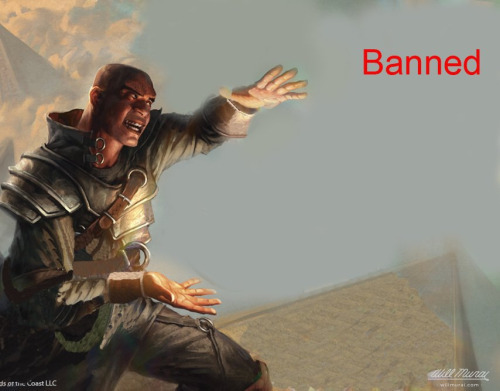
Original image posted by @sarkhan-volkswagen
Wizards of the Coast announced bannings this past week, and I can’t say I’m surprised. Emrakul, the Promised End, Smuggler’s Copter, and Reflector Mage were banned in Standard, while Modern bans were simply Gitaxian Probe and Golgari Grave-Troll. There have been mixed feelings about these bans: many people were annoyed and upset that their favourite cards were banned, while others were quite relieved.
Emrakul, the Promised End, the final titan to be released, and the first to be banned. According to WotC, Emrakul was “created to be scarily powerful,” and “delivered on that promise too well.” @ugin guessed that “if an Emrakul hit the field, I would guess that approximately 90% of the time that person would win.” Scarily powerful indeed, and this was made even more scary with cards like Aetherworks Marvel. As a counterpoint, @life-is-short-for-us said that it isn’t unbeatable, but didn’t suggest how to actually beat it. Instead, he simply said that for Standard, it isn’t about “banning cards that are too good, but banning cards that are so good they are damn near impossible to beat and your only hope is playing the mirror match and they are like 70% of the field.”
This brings us to our second card banned, Smuggler’s Copter. While I don’t play much Standard, this one annoyed the hell out of me, and now that it’s banned, I’m kinda relieved. For this one, Wizards says that it was in too many of the top decks and was restricting creativity. I agree, as does @queen-marchesa: “The one that is least surprising is the Copter. It really was too omnipresent in Standard to allow for exploration or creativity.” I have always thought that the Looter Scooter was too powerful for a turn-two artifact, which helped turn the format stale.
Our final Standard banning was Reflector Mage. There’s not much to say about this one, really, and I think it was one of the odder bannings. Wizards says that, “Our data showed the White-Blue Flash deck was too powerful against the field,and Reflector Mage has been on players' lists of most-disliked cards, since the days of Collected Company.” I suppose when you take down decks with Emrakul and Copter, W/U Flash would be the one to dominate. Tumblr users agreed, with one stating, “The card ended up being very effective in this format.” Others thought it was a surprising ban, but seeing that it’s stuck around for so long, “makes sense.”
As for the Modern bans, let’s start with Gitaxian Probe. This one is one of the least surprising to me, as it takes some skill out of the game. According to @jurou-tenshi, “Git probe has had it coming for a long time. It enabled too many degenerate strategies.” @avatar-of-woah states, “Probe’s actually a real issue in infect because it takes play skill out of the equation. Instead of trying to read your opponent and what they could have that would beat you, you just pay two life,” and proceed from there. According to @urzas-raven-armour, “With the probe ban, storm is even less playable now.” I would assume that this ban also hits Delver decks, but I don’t know enough about them.
The final ban released this week was Golgari Grave-Troll, and from what I have found, people are glad to see it go. One user said that “Dredge is a silly silly deck that has proven to be too powerful for Modern,” and with the Delve mechanic brought back in Khans of Tarkir, I agree. Golgari Grave-Troll is a creature with Dredge 6, and it enters the battlefield with counters equal to the number of creatures in the graveyard. You can also pay one generic mana and remove a counter to regenerate it. Now, that seems extremely powerful to me, especially in the late game, where you’ll most likely have a lot of creatures in your graveyard, but it is definitely the Dredge 6 that puts it over the top, enabling way too many graveyard shenanigans.
--- Connor S, @solemnly-mystifying
2. This Past Week’s Magic Story Review

Kari Zev - playing around with a doodle. | Original art by @sketchydoodles
In this past week’s new Kaladesh Story “The Skies Over Ghirapur,” by Ari Levitch, we were introduced to the feisty teenage pirate captain, Kari Zev. In this story Kari Zev and Jace Beleren team up to assist the renegades, first by going on a heist to obtain aether, then to help the renegades take on the Skysovereign after they lost control of the Aether Hub in the story “Burn.”
The Tumblr community met this story with overwhelmingly positive reviews. The community adored the tenacity of Kari Zev and her sidekick, the monkey Ragavan. Tumblr user @zomburai claimed that the story was a delight. Others, like @abzanascendancy, were most excited about sky pirates. They also applauded Kari Zev for being 15, yet also being able to “pilot, command and crew her own ship.” Community members were even more excited about pirates then they were already, and some probably hope that a pirate-themed block will come along in the not-too-distant future.
With only three stories left in the Aether Revolt storyline, the MTGcommunity is anxiously waiting to see what happens next, with the Gatewatch’s final confrontation with Tezzeret and the Consulate, and what else that is in store for the plane of Kaladesh.
--- Chelsea W, @chelsea-beleren-vess
3. General Magic Story Discussion and Speculation

Deploy the Gatewatch | Original art by Wesley Burt
This week has been rife with Magic Story metadiscourse, from speculation for the future, to reflection on the past. Fans discussed Nissa’s shift toward tolerance in Magic Origins, and whether or not this made her a “Mary Sue”, prompting @commandtower-solring-go’s analysis of the term and its relationship to Magic [x]. On the other side, @chelsea-beleren-vess compiled potential points of civil war foreshadowing [x]
Prior to her Origins revision, Nissa, like most elves, believed that elves reigned superior over other races, and moreover her band of elves above even other elves. When her backstory was updated, these biases were no longer present. Lots of fans were upset by this. They missed their little racist, which is a little distressing, honestly. It’s important we ask ourselves why it’s so important for her to be hateful. This led one user to ask @markrosewater why the Gatewatch was composed of “Mary Sues.” By and large, “Mary Sue” is a term used to degrade a character for being all-powerful or infallible. This term really doesn’t describe the Gatewatch. Take Gideon, who was too proud and got his Irregulars killed, then repeated the mistake on Zendikar. Look at Jace --- neglectful of his duty as the Guildpact, and by even his own admission, annoying and pretentious as all hell. Liliana is, well, Liliana. Chandra has consistently been short-sighted and rash; she has consistently endangered the lives of the people she cares about, including the Gatewatch (see “In This Very Arena” and “Burn”). Nissa has been altoether aloof and unable to relate to her teammates, and was made to suffer immensely over the course of the Battle for Zendikar storyline.
Wizards could be setting the stage for a civil war within the Gatewatch, ala Marvel. In this hypothetical confrontation, Gideon leads one side, while Jace rallies his allies. Who will side with whom is anyone’s guess, but I’m personally partial to Chandra, Nissa, Gideon, and Ajani squaring off against Jace and Lili, but this is clouded by my distaste for Lili and her relationship with Jace, so take what I say with a grain of salt.
--- Nick D, @nick-dowdle-jeskai-judicator
4. Incoming WoTC President Chris Cocks’ Digital Tease
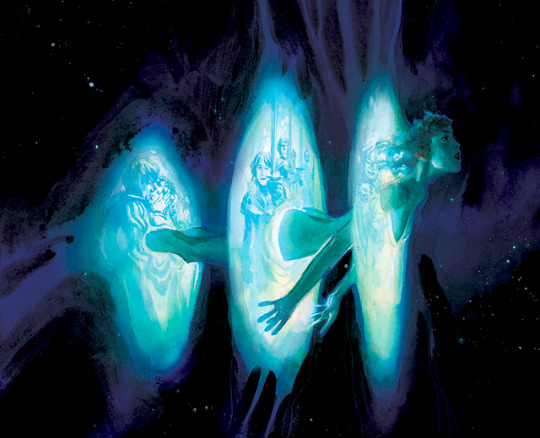
Glimpse the Future | Original art by Andrew Robinson
Last Thursday, the President of Wizards of the Coast, Chris Cocks, released a public statement regarding the future of WotC’s IP, concentrating on the following points:
Reimagining digital versions of Magic and other Wizards games.
Bringing their characters and worlds to other games and experiences.
Making people’s Wizards experiences more efficient, connected, and convenient.
What most Tumblrs seemed to latch onto was the idea of Magic: the Gathering or Dungeons and Dragons branded video games, and many people wanted to share their thoughts on the matter.
@simic-initiate said, “I’ve no doubt irritated many friends by consistently insisting that Magic has a criminally underused mythos and cast of characters. Wizards does SO much world building each plane that just, hardly gets used again if ever.” [x]
@planeswalkerwithtardis suggests, “Persona JRPG with MtG characters as the personas, color combinations replace arcana. It would also hedge Wizard’s bets by crossing their customer base for that product with the ever hungry Persona fan base.” [x]
@youknowwhatscrewyou went a different direction: “I would love an mtg fighting game, similar to smash bros or something, so that is not too competitive and allows for some fun, crazy stuff.” [x]
@mixingmetaphorsoup also thinks MMOs are a hiding to nothing: “What? Throwing spells at a Planeswalker in an MMO? Surely you mean MOBA. As I’ve said before, Magic fits perfectly into a MOBA shell.” [x]
What video game genre do you think would make a good Magic game?
--- Liam W, @coincidencetheories
BONUS! “LILIANA VESS - MAGIC THE GATHERING.” Original art by @lunardays22

Please support them at their Redbubble!
Thank you again for reading this week’s issue of the MTG Weekly Tumblr Recap. If you are interested in contributing to the Recap, either by keeping track of notable posts and trends throughout the MTG community on a given week, or writing a short blurb on a specific topic, please PM our main editor @the-burnished-hart or any of our staff writers.
#mtgwtr#mtg weekly recap#mtg weekly tumblr recap#weekly tumblr recap#mtg recap#saheeli rai#isharton#felidar guardian#mtg banned list#b&r update#emrakul#smuggler's copter#reflector mage#gitaxian probe#golgari grave-troll#standard#modern#magic story#mtgaer#aether revolt#kari zev#ragavan#jace beleren#gatewatch#magic story speculation#liliana vess#chris cocks#mtg mmo
67 notes
·
View notes
Text
Danganronpa V3 Liveblog Part 2 [Chapter 1 - Daily Life]
Yeah I may as well put the rest of this under a read-more right from the start since I wanna get right into spoilers.
Just to jump right to the end of what I played because it’s the elephant in the room, I called Rantarou being the first death before the game even came out in Japan. But I think everyone did. It was really obvious that either he was going to survive for most/all of the game, or be killed off immediately to troll everyone because he’s set up as being so mysterious and presumably plot-important. I’m not really angry about it, but it’s just kinda funny that I called this nearly a year in advance. Thankfully the rest of the game should be less predictable than this, since this was the only real thing I confidently predicted back then. Also for the record I had no actual, genuine idea about this in advance, it was just a guess of mine.
It’s weird that in the demo version they had him [and Keebo] sit out of the trial, when he ended up not surviving long enough to take part in a trial in the main game.
Either way, it’s at least kinda amusing that he died immediately when he felt so similar to Komaeda. Obviously it’s still lame to see him die so soon, but at least his character played out differently to Komaeda.
[Also for the record I’m hoping that Kokichi saying ‘my dearest Rantarou’ was just him making an inappropriate joke, because hoo boy it was bad enough when DR3 ended with the Bury Your Gays trope. I’d be genuinely angry if this game STARTED with it. I’m pretty sure it’s just a joke, but it does remind me that Kokichi/Rantarou was actually a relatively popular crack ship in the fandom, at least back before the game came out in Japan]
I stopped playing directly when the investigation officially started [so technically I played a few minutes of the Deadly Life segment but that was because the game didn’t let me save for a while], so I can’t exactly speculate much about the case, and I don’t want to. I’ll save that for after I play the investigation, since I’ll actually have proper clues to work with then. I know that the investigation part will probably be a lot shorter than this part, but I want to take a break between it and the trial so that I get a chance to sit down and post some speculation before I go through the trial and figure out what happened. So my next post might be a bit short. Maybe. Knowing me, it probably won’t be.
Since I was scared this would happen, I tried to talk to him as much as possible, but I only managed to have one actual scene with him. I also had one with Shuichi. Now that Rantarou’s out the way, I guess Shuichi will be the person I prioritize most in free time events. Not sure who else I’d go with. I’m kinda curious about Keebo since his backstory seems interesting, but I dunno. I kinda want to see what Kokichi’s deal is, but part of me also feels like he’s probably gonna stick around for a long time so I’m less inclined to prioritize him. Maybe I should talk to Maki more, since she seems like the type who I’ll need to really get to know before I see more sides to them.
Overall, I was sorta surprised by how much I really liked this part. I mean, I’m a big fan of the series in general, but I’ve been a bit worried about whether or not I’d actually enjoy this game and it’s cast. Thankfully those fears are getting dissipated. I was also afraid that it’d feel too similar to the first two games, but there’s enough different things happening that it’s enjoyable.
One of the things that surprised me most was the motive. Or, well, motives. I did not expect the stakes to get so high that quickly. The whole idea of ‘the first murder will happen consequence-free’ is actually really interesting, and an effective way of motivating a murder. But it definitely makes Monokuma seem way more desperate than he used to be. Especially when, like a day after the first motive, he was like ‘oh and if nobody dies soon, you all die’. At that point he’s literally forcing people’s hands, more or less. Which isn’t a criticism, really. It’s an interesting approach to take. Especially since nobody ended up actually using that motive to kill. The whole part where nobody outed themselves as being Rantarou’s killer, and Monokuma announced that they’d hold a class trial in that case, was really intriguing. It’s really making it hard to guess at the culprit’s motive.
On a similar sort of note, I was not expecting the part where Ryoma suggested that somebody murder him so they could escape and find help. I thought at first that he’d just generally suggest the idea of someone going through with murdering someone, but I probably should have expected him to be all self-sacrificial, given his attitude. I said it last time, but I REALLY like Ryoma as a character thus far.
I said I wouldn’t speculate much about the murder, but lol I can’t help myself now that I’ve seen the body. I can only make vague judgments about it, though. Like how it seems pretty obvious that Rantarou wasn’t directly murdered by someone, but instead somebody probably set a metal ball on the bookcase so that it’d roll off and hit his head when it opened. Maybe that’s just my first guess because Kaede already brought up the idea of Rube Goldberg machines earlier in the chapter. It’d also explain how the murder will remain mysterious even with photographic evidence. There probably wasn’t anyone else in the room. I assume that Monokuma would still consider the identity of the hypothetical ball-placer to be the culprit, so then the big mystery is figuring out who did that, when there’s presumably no evidence. But then again the ball could have only, in this scenario, been placed on the bookcase after the equipment was set up, otherwise Shuichi would have noticed it at the time, or the alarm would have gone off. Unless he’s the killer, which I’m really doubting.
Ignoring the option of Shuichi being the killer, he and Kaede at least have alibis. I don’t know if anyone else would have. I’ve kinda forgotten if the equipment got placed early in the morning, or right before those two hid in the classroom, so I’m not sure what time frame to work with for this one, in terms of figuring out alibis.
I feel like the seven people who went to the game room are probably being set up as people who all have mutually-verified alibis, at least. Which leaves like seven other people.
Oh well, I won’t think about it too hard until I finish the investigation.
On the topic of Shuichi, I also really like him as a character. I liked him after the prologue, but learning a bit more of his story made me like him even more. He’s a really interesting take on a detective character. I’m glad he’s not just another Kirigiri. I can really get why he feels so uncomfortable about the idea of pursuing the truth, when he ended up exposing someone who did a revenge-killing for sympathetic reasons.
I also just really like his dynamic with Kaede. They’re just adorable and mutually supportive and I love it. I’m not gonna lie, I kinda low-key ship them already. I have low standards for this sorta thing, lol.
Kaede’s also pretty interesting as a protagonist, especially in terms of how people react to her. It was kinda sad seeing everyone [well, nearly everyone] hate her for being optimistic and leader-y and wanting everyone to keep trying to escape. Considering how it’s already giving her confidence issues, I wonder if that’ll be an ongoing thing, with most of the cast not wanting to be bossed around by her. I couldn’t really blame them after how the Death Road of Despair part went, but they still took it too far.
Also on that note, fuck the Death Road of Despair. That was so awful to experience. Considering how the story played out, I imagine that the game was genuinely rigged against you, and it sure as hell felt like it. I hope that if this game ever shows up again in a less evil context, the controls aren’t so weirdly floaty and hard to control. I kinda wish I could have recorded the way my reaction to it went from ‘oh this sounds simple, just run and rump’ to ‘wait the fuck why is everyone dead’ in ten seconds.
Anyway, I’m really enjoying seeing more of the characters, and seeing them start to form their own dynamics and stuff. It’s only just starting, but it’s already interesting to watch unfold. I’m especially surprised by how Tenko pretty much immediately got a crush on Himiko and is now just following her around and acting so excited about the idea of magic. It’s really endearing me to her.
This part also continued to reaffirm my love for Gonta. He’s an incredibly sweet boy who doesn’t deserve the death that he’s presumably going to experience. He tries his best.
I’m happy that Kaito is at least trying to be on Kaede’s side. He’s a good dude thus far.
Conversely, I probably should have expected that Maki would be rude and unsociable. I’ll probably still try and spend free time with her and get to know her, though. It makes me feel like there’s something really interesting under her cold exterior that I’d never get to see if I just avoided her.
Angie’s kinda starting to creep me out, which I wasn’t expecting. Like, the blood sacrifice joke was one thing, but now she’s talking about happily accepting imminent death because Atua will welcome her into his kingdom, or Atua punishing liars, and stuff. But then again she also unironically says bye-onara and that makes me really like her.
I guess I may as well comment on Rantarou’s character in general, since this might be my last time to. I wish I could have gotten to know him better, but the one event I had with him didn’t tell me much. I’m still not sure what to make of him. He’s also kinda creepy, but I still like him. I’m not gonna deny that most of my bias toward him is still because I love [most of] his design, though. I wonder if we’ll ever learn what his talent was, since that’s still a mystery. Maybe it’ll be a plot point during the trial. I’m also curious about the fact that he seemed to have some memories related to the Ultimate Hunt, which is still suspicious to me in general as a concept. I really can’t help but feel like this game is set in some future post-DR3 where the rest of society decided to criminalize talent or something. Or they had a grudge against the whole Ultimate Initiative, and Hope’s Peak Academy, and thus they decided to hunt down everyone related to it, or something. Who knows.
I’m really surprised by the fact that none of the characters have said anything about the implication of them being criminals, with how they’re in an academy for Gifted Juveniles. You’d think that’d raise some questions from them.
Also, I wonder if everyone’s labs are going to be actual places we can at least see on the map. I think thus far we can only see Kaede’s and Miu’s rooms. Maybe the rest will open up as time goes on. On the note of their labs, I should check and see if I can go to Kaede’s one now. I kinda forgot to check it out. I think I tried to check once but the plot was railroading me elsewhere and I forgot about it after that.
Oh, and before I forget, I didn’t miss that one line from one of the Monokubs where they were obviously teasing at what’s going on in the big picture, but basically blotting out the important info. I can’t quite remember exactly what he said, though, but I remember it seeming immediately important.
And also, on the note of Monokuma, that one Monokuma Theater joking about the idea of getting confused about what happened and in what part of a long-running franchise really felt like a self-deprecating joke about how long this series has gotten. [Also the Yokai Watch reference was pretty hilarious]
I guess that’s all I have to say for now. I’ll probably just play the investigation part tomorrow, even if it might be kinda short, and then I’ll do the trial the day after. I don’t really have any predictions about who the killer is, other than that Shuichi seems really damn suspicious right about now.
0 notes
Text
Saving it for the seminar
It used to be that my writing was prompted by conversations I had in real life – after openings, after classes, after late night ‘salon’s’ with friends – unfinished conversations I felt compelled to continue in imagination long after my interlocutors were no longer within ear shot. Sometimes these addendums were motivated by the kind of resentment that is all too familiar to those who claim “introversion” as a defense for their fear of speaking up, though more often than not they were more simply motivated by an obsession with the points under discussion, which I felt compelled to parse in private, and after the fact of their provocation. Lately though, I’ve felt less compelled to write (even though I have more time than I ever have had to do so.) I tend to go to fewer openings, fewer exhibitions, fewer parties – and the ‘salons’ I used to attend have dissipated as my closest friends have moved away to seek their fortunes in other cities with a greater concentration of these conversations (we all know which city/ies I’m referring to, right – and that the ‘ies’ is merely added out of politeness?)
But of course that’s not entirely true. I still go to at least as many exhibitions as I always did, if not more. I’ll usually go a few weeks after the opening, sometimes with a friend, other times alone – which is to say – I’m still making the effort to be a ‘good citizen’ – at least where art and the ‘community’ around its production and distribution is concerned. I’m just not as interested in converting each of these experiences into online prose as I was a couple of years ago. There are always exceptions – but for the most part now the urge to write is more often prompted by discussions I witness at a distance online – conversations I used to be more tempted to participate in directly – but that I increasingly find myself trying to slowly back away from as a silent witness – even as I find it difficult to look away (usually when I might be better served and be of more use to others by attending to other things – like my job or my work - both of which of course dovetail with this sometimes pathological attention to other peoples conversations, and are thus easy to rationalize as being served by listening in.) After all – I inevitably care a great deal about the outcomes of these conversations – though my engagement with them tends towards the kind of spectatorship that is probably more familiar to an older generation’s relationship to watching sports on television…which is to say I’m a lurker in these discussions – a wallflower, a watcher, and of course a judge. I often find these discussions laborious, derivative, predictable, tedious, disappointing, deflating…in a word - disincentivizing (which is sort of the same thing that happened to my enthusiasm for digital photography after a year of being deluged with the stuff when I first joined tumblr.) This is why I usually stay out of them. A recent post of a left wing outrage phrase generator by a friend on Facebook nicely summed up what it has felt like watching people I respect habitually lower themselves by taking their place in an online chorus of predictable grievance and countegrievance. Another friend put it best, in calling the online essays that often provoke these discussions – “Like Posts” after another article – “Like Art” which truth be told is what initially prompted me to sit down and write this morning, though having done so now I (predictably) no longer feel the urge to weigh in on it directly. (even though I still can’t help myself from doing so*)
All of this is also reminding me of an anecdote in Marc Fisher’s 2009 book Capitalist Realism, written just a few years before peek Facebook, about a college student who always had his headphones close at hand in class – sometimes on his head without music playing, other times resting on a table nearby with music playing at such a low volume that he could barely hear it. Fisher speculates that this incessant need for distraction – even when it is merely hypothetical and potential – has less to do with the actual experience of being distracted by the object itself – be it music, or as I refer to in the case I mention above – the incessant din of “online community” – which as everyone by now understands is more often than not a contradiction in terms with nevertheless all too real consequences in the real world – like the emergent entity of nihilistic spectatorial voting blocks motivated by little else but a disappointed masculinist desire to see the world burn - than it does with the felt existential need to feel that the “matrix is still there, within reach” – an ontological sickness that no longer only applies to the traditional objects of aesthetic enjoyment, but even and especially to one’s own circle of friends, social contacts, and even political rivals, as well as one’s own “private” experiences, which are all cultivated and maintained as objects of aesthetic consumption/distraction, so as to avoid processing directly what if feels like to live in this world at this moment, in which seemingly everyone is trying as hard as they can to squeeze themselves into the device in the palm of their hand as the world closes in around them. Not just pop (as Fisher maintains) but life itself under capitalism “is experienced not as something which could have impacts upon a public space, but as a retreat into private ‘OedIpod’ consumer bliss, a walling up against the social.” And doesn’t this apply to our politics as well, even as public spaces are now being harnessed once again for the theatrical online staging of our “resistance”? (Isn’t it only a matter of time before Facebook introduces a ‘raised fist’ reaction button?)
All of which again is to say – even though I’m as implicated in all of this as all of us are - I’ve been trying to maintain some distance (as I’m sure we all have) and I’ve been trying to restrain my urge to “weigh in” with a “hot take” on the latest article, video, or outraged sentiment that crosses my news feed, and save it for the seminar, where the stakes feel higher, and the takes hotter (and cooler) than they ever do online...and of course this is an immense privilege, for which I am incredibly thankful. Without it I’m certain I would have written many more things in the heat of the moment that I would live to regret in a year or so.
* my main objection to this essay, as with a similar one by another author writing about the work of Amy Feldman, is that both infer (cynical) intent on the basis of the shortcomings of the distribution apparatus through which the work is encountered. (On the other hand - what I appreciate about both of these articles - aside from their excessive comic vulnerability - and what motivated my own engagement in this sort of writing a few years ago - is that at least they’re willing to take the relationship between the objects and their makers and the site of distribution and reception seriously.) On the flipside of my objection to these authors is my objection to their critics, who seem to want to absolve the artists involved of any responsibility for the way in which their work is distributed and received. In both cases, I think the parties involved are guilty of a kind of bad faith, and one with which I am all too familiar, having succumbed to similar temptations in my own writing about exhibitions on this blog a few years ago. So I understand the resentment a critic feels walking into an exhibition which feels stingy and whose aesthetic decisions feel (though they may not in fact be) overly determined by economic considerations, just as I understand the resentment artists feel when critics hold artists to task for all of capitalism. I’ve been on both sides of this, so I think I get why so many of my friends are either worked up about it, or feel the need to (defensively) demonstrate just how not worked up they are.
0 notes
Photo

New Post has been published on http://websiteshop.network/episode-438-qa-with-robb-nicki-31/
Episode 438 – Q&A with Robb & Nicki #31
http://robbwolf.com/2019/08/02/episode-438-qa-with-robb-nicki-31/
It’s time for Episode 438, Q&A #31!
Submit your own questions for the podcast at: https://robbwolf.com/contact/submit-a-question-for-the-podcast/
If you want to see the video for this podcast, be sure to check out our YouTube channel.
Show Notes:
1. Is Carbonated Water Okay? [1:41]
Brice says:
Just listened to Wired To Eat and loved it. I’m not too far off from this diet, am pretty “fit”, but too frequently make exceptions which I think are totally sabotaging my efforts.
I’m still curious about your thoughts on carbonated water without added colors and flavors – like Topo Chico, Croix, Perrier, etc. I have one of these every couple days.. more as a treat than anything.
2. Have You Seen This Gluten Enzyme Study? [3:40]
Austin says:
http://suppversity.blogspot.com/2015/06/the-gluten-solution-aspergillus-niger.html
This is an enzyme that apparently neutralizes (or has the potential to) the inflammatory effects of gluten. I’d love to hear your thoughts on this. If you’ve talked about it in a podcast already could you point me in the direction of finding it. If you haven’t talked about it, could you include it in an upcoming podcast?
Thanks, Austin
3. Ancestral Consumption of Psychoactives? [7:42]
Charles says:
Hey there Robb!
I’m a “never smoker” as my doctor calls it and intend to stay that way, but this week I’m experimenting with very low dose nicotine patch. Got 21mg clear patches and cut into 8 to 12 pieces, one per day during daylight hours. Intentionally avoiding the nicotine rush I’ve found with gums and lozenges. Jury is still out overall, but so far it seems to help improve ADHD, intermittent fasting, and persistent low mood.
But that got me to thinking: For ancient hunter-gatherers, what would the usual modes of consumption be for such “medicinal” plants? Aside from smoking (“hey let’s light this stuff on fire and breathe deep! great idea! cough cough gag”) which is indeed attested in the historical contact record… My guess is tobacco, coca, and khat in their weaker pre-agricultural breeds would be chewed and spit. Maybe Mary Jane (again, the weaker natural version) would be an herb to go with fatty meats. Yerba mate and ordinary tea we know have been drunk in a hot water infusion. Then there’s coffee and chocolate which are more recent…
Maybe part of our modern problem with drug abuse isn’t the drug itself, but rather how it’s been bred and prepared incorrectly. Much as it is with food. This is all speculation though. Have you given the matter any serious thought?
4. Vegan Vitamin D3? [23:36]
Leonardo says:
Hi Robb,
I just wanted to ask how do they make VEGAN vitamin D3 supplements?
Vitamin D3 as cholecalciferol is an animal product and it is created from cholesterol, isn’t it?
How do lichens or other sources produce it? Is it the same form? Is it bioavailable in the same way?
Thanks for everything you do, I appreciate your work,
Leo
5. Gut Dysbiosis Concerns on Keto? [25:06]
Keenan says:
Dear Robb,
I appreciate very much your non-dogmatic approach when it comes to tackling information regarding VLC and keto dietary approaches (ie who are you, what are your performance needs, are you sick and busted up, a hard charging athlete, etc). That’s why I feel you’re the best person to ask about this, as you aren’t inherently biased.
I have a family history of cancer, depression, mental illnesses, addiction, and adult ADHD. I haven’t been diagnosed with any of these issues, though I definitely deal with unevenness in mood and focus. Besides my interest in preventing any future health issues for which I might be at risk, I’ve found that a very low carb, high fat diet just seems to suit my brain the best. I’m less irritable and anxious, my sex drive is fine, and most importantly for me, my focus and attention is just totally on-point. I’ve tried a multitude of eating styles but VLC is the only one that finds me springing out of bed in the morning with the birds chirping and excitement to get to work each day. I call it “natures adderall” except I don’t have any crazy stim-mania.
The only thing holding me back from maintaining this approach is a nagging worry about the hypothetical implications of long term VLC, as it pertains to GI microbiome diversity, potential dysbiosis risks, mucin production, thyroid problems, etc. I’ve read as much as I can find from the experts I tend to trust in this field (Attia, D’agostino) but I’ve yet to find anything that definitevly quells my worry of causing some sort of damage, from which it might be difficult to come back.
Do you think the long terms risks might be overblown? I do take prescript-assist and raw potato starch as potential mitigators, but I don’t know if VLC is taking a step or two back for my gut bugs, and I’m very concerned about treating them well. I always suspected gut problems being at the root of my late father’s alcoholism and his myriad of inflammatory problems. Some of these worries have prevented me from staying in keto for longer than about a month at a time. Every time I start phasing a larger amount of carbs back in, however, there’s a mild and annoying accompanying brain fog and up/down cycle, seemingly irrelevant of the dietary source.
I understand that these questions get vetted and you’re busy, so no worries if this doesn’t make the cut. I sincerely appreciate everything you and your team have done for the health of my family and myself, as well as the awareness you’re raising regarding even larger political issues we’re facing.
Sincerely,
Keenan LeVick
Where you can find us:
Submit questions for the podcast: https://robbwolf.com/contact/submit-a-question-for-the-podcast/
Transcript:
Download a copy of the transcript here (PDF)
Robb: Howdy, wife.
Nicki: Hello, hubs.
Robb: Seems like I’ve seen you here before.
Nicki: Once or twice.
Robb: Yep. Anything new? Anything exciting? Got anything to share?
Nicki: Just no, moving is a B-I-T-C-H and just getting all of our to-dos done. It’s just a process.
Robb: Indeed it is.
Nicki: Like they say, you chop wood, carry water.
Robb: Yeah.
Nicki: Got to get her done.
Robb: Indeed. I guess with that we’ll get this podcast done.
Nicki: Okay. Let’s see.
Robb: Most awkward start to a podcast ever.
Nicki: Always, always, we’ll win that award. Okay. Our question to kick this week off is from Bryce on the topic of carbonated water. Bryce says, “I just listened to Wired To Eat and loved it. I’m not too far off from this diet. I’m pretty fit, but too frequently I make exceptions which I think are totally sabotaging my efforts. I’m still curious about your thoughts on carbonated water without added colors and flavors like Topo Chico, La Croix …”
Robb: La Crotch.
Nicki: La Crotch, that’s what we call it.
Robb: It’s still good stuff, but …
Nicki: “Perrier, et cetera. I have one of these every couple days, more as a treat than anything. Robb, what do you think about Topo Chico and other non-flavored, carbonated waters?”
Robb: You know, when I contemplate the potentiality bordering on certitude of the implosion of civilization, two things I’m very concerned with. One is how will I get coffee? And two, how will I get bubbly water? So, I mean, as far as derailing something, every once in a while you hear something that’s like, “Oh, I had bubbly water and then I had to eat a whole cheesecake,” and it’s like, “Well, where did the cheesecake come from? You’re not supposed to have that in your house anyway,” so I think bubbling water is great. I’m not sure if Topo Chico has much in the way of minerals but I know the German “Gervolshesteiner” water, whatever, has a lot of magnesium. I think those things are great. It’s a nice way to break things up.
Nicki: It’s great with some lime juice.
Robb: Pretty good with some element in it but you’ve got to be careful because that shit will bubble over.
Nicki: Bubble over like a volcano.
Robb: Yeah. I can’t find anything really to fault with it, so yeah.
Nicki: No, and you don’t have to have it every couple days. You could have it every day.
Robb: We often do.
Nicki: As we often do.
Robb: And we’ve lived to tell the tale, thus far.
Nicki: Yeah, thus far. Thanks Bruce. Let’s see here, our next question is from Austin. “Robb, have you seen the study about a gluten enzyme? This is an enzyme that apparently neutralizes or has the potential to neutralize the inflammatory effects of gluten. I’d love to hear your thoughts on this. If you’ve talked about it in the podcast already, point me in a direction. Otherwise, what are your thoughts?”
Robb: Yeah, it’s interesting stuff. I guess you could say it’s neutralizing it. The aspergillus niger enzyme is a prolyl endopeptidase which has the ability to chop up the gluten protein. Gluten proteins and some similar proteins are very rich in proline and the way the structure is put together, most proteases … most of the enzymes that break down peptides and peptidases, proteases, they have a tough time getting in there and acting on gluten and similar proteins. It’s almost like a prion in a way. It’s just difficult to break down. What appears to be the case is that if you were celiac or someone …
Robb: See, this is where it gets a little bit tricky, if you have non-celiac gluten sensitivity, and so maybe your problem is wheat germ, a glutenin and not gluten. Then this may or may not really help you. It might help … I’m not sure about the efficacy of attacking wheat germ or glutenin versus gluten itself, but if you provide that enzyme and you get a pretty low dose, like what would be consistent with just kind of cross-contamination. You know, like a steak gets grilled on a grill that had some toast on it or something like that, it’s probably okay.
Robb: What it doesn’t allow you to do is as a celiac, go sit down and eat a gluten containing pizza and come away scot-free. So that’s one piece of the story, and it’s really interesting because one could … THere’s this whole story in the kind of gut microbiome and our ability to digest different things that is very dependent on the gut flora. So, there was a fantastic study. It was a clinical intervention in children with celiac disease. They demonstrated that they had villous atrophy. You know, the damage to the intestinal lining, and then they did a fecal transplant on these kids, ostensibly with microbes that have this prolyl endopeptidase that’s in them.
Robb: Never really 100% sure, because you have to actually sequence for the gene and not just the species, and all that type of stuff, but in theory, it had the potential hardware to do this, and I believe seven out of the 10 kids, upon subsequent gluten challenge, showed no villous atrophy after that, and no signs and symptoms of reactivity. So it is really interesting, and one could make the case that a lot of our ability to digest a wide variety of substances probably should be augmented from … excuse me, a healthy gut microbiome, which is ever more challenging.
Robb: With processed foods, we lose gut diversity. With antibiotics, we lose gut diversity, and it’s unclear how exactly you get those back. It may be that all of us are going to need to take a poop capsule that’s harvested from the one remaining person that’s healthy on the planet, and we need to do that once every six months or once a year or something like that, but, I mean, these gluten degrading enzymes have some efficacy. You can’t be a knucklehead in using them, and then there are some other approaches, like the fecal transplant, that show some really remarkable promise for people.
Nicki: Okay. Let’s see, our next question is from Charles on ancestral modes of consumption for psychoactives.
Robb: That’s a mouthful.
Nicki: “Hey Robb, I’m a never smoker, as my doctor calls it, and intend to stay that way, but this week I’m experimenting with a very low dose nicotine patch. Got 21 milligram clear patches and cut into eight to 12 pieces, one per day during daylight hours, intentionally avoiding the nicotine rush I found with gums and lozenges. Jury is still out overall, but so far it seems to help improve ADHD, intermittent fasting and persistent low mood.
Nicki: “But that got me thinking. For ancient hunter-gatherers, what would the usual modes of consumption be for such medicinal plants? Aside from smoking, ‘Hey, let’s light this stuff on fire and breathe deep.’ ‘Great idea, cough, cough, gag,’ which is indeed attested in the historical contact record. My guess is tobacco, coca and …” is that cat?
Robb: Mm-hmm (affirmative).
Nicki: “In their weaker, pre-agricultural breeds, would be chewed and spit. Maybe Mary Jane? Again, the weaker, natural version, would be an herb to go with fatty meats. Yerba mate and ordinary tea, we know, have been drunk in a hot water infusion. Then there’s coffee and chocolate, which are more recent. Maybe part of our modern problem with drug abuse isn’t the drug itself, but rather how it’s been bred and prepared incorrectly, much as it is with food. This is all speculation though. Have you given the matter any serious thought?”
Robb: Yeah, I’ve noodled on this a bit. I wouldn’t consider myself an ethnobotanist by any means, but have tinkered with psychoactive substances throughout my career and have found nicotine to be really beneficial for focus. It helps with some GI related issues. On this addiction story, I really should dig this up. Again, I forget where the study was performed, but it looked at addiction rates in … or addiction propensity for … This was not food. They were looking more at nicotine and cocaine and stuff like that, in indigenous peoples, and they also did some interesting experiments in animal models. What they found is that in the animal models, if the animals had a very enriched, engaged environment, as close as they could get to a legit free living, natural world, the tendency to want to go take a sip out of the cocaine laced water was kind of trivial.
Robb: The mice would check it out once in a while but it really wasn’t a big deal, whereas when the mice were bored and in a non-stimulating, enriched environment, they couldn’t get enough of this stuff. And so I think a lot of the tendency towards addiction of all kinds, whether it’s video games or food, although food acts in kind of a different way because there’s kind of an underlying survival mechanism there. You know, optimum foraging strategy plus palate fatigue, kind of overlapping, and then the fact that people really do engineer food to be more-
Nicki: Overeat.
Robb: Yeah, propensity to overeat, there’s maybe a little bit of a different story there, but by and large … And this is kind of a weird thing, because you can wax nostalgic about our hunter-gatherer past and you forget disease, infections, murder, tribal warfare. You know, infant mortality. There’s some super gnarly stuff, but also-
Nicki: Poisonous bugs.
Robb: Poisonous bugs, but there’s also studies within the Kung San, within the Hadza. These people are generally … they appear to be very happy and content. I remember there was a Huffington Post piece talking about a guy going to spend some time with the Hadza, and there was like an 11-year-old boy that was sent from the tribe to go meet this guy. When the guy met the boy, he said, “Hey, how long have you been waiting for me?” And he said, “Not long.” He was like, “Okay,” and then as they talked more, he said, “Well, how long were you there?” He’s like, “About four days.” The guy was like, “Well, that seems like a long time.” He’s like, “No, not particularly long. We didn’t know exactly when you would be here.”
Robb: For a modern person waiting four days, they would lose their fucking mind. I probably would, whereas … and again, you don’t want to overly romanticize this stuff, but there’s something that’s just different about being comfortable in your environment that … “I’m waiting for this guy and I’ve been here four days.” I don’t know how long it would have been considered long. Like a week, a month?
Nicki: Three weeks, yeah.
Robb: Yeah, I don’t know, but the kid was basically just kind of hanging out there, and that just speaks to a very different kind of mental state and processing and all that. There’s all this literature that suggests just being out in nature is very restorative to people. When I did the I, Caveman show, it was very difficult on a lot of levels, but one of the coolest things about it was that there was no multitasking. When you needed to do something, you did that one thing, because you couldn’t multi-task in this scenario. Like if you screwed something up, then it might take you twice as long, and I really went into that thing with a … which a lot of my castmates did not, but I really went into that with the mindset of, “What if this really was the way that I had to live the rest of my life? How do you play this game then?” It made you think about injury and-
Nicki: Feeding your family.
Robb: Feeding your family and stuff like that, and so you really had to focus, so I think so much of this kind of addiction story is really kind of a malaise with modern living. It’s interesting because specialization has allowed us to … Matt Ridley, The Rational Optimist book is amazing. It talks about how specialization has arguably allowed us to improve our standard of living and, in theory, work less hard even though we seem to be working ever harder and longer hours and all this stuff in the quest for the accumulation of stuff, and you’ve just been reading Mark Manson’s book …
Nicki: Everything Is …
Robb: Thought.
Nicki: Thought. It was great.
Robb: He touches on a lot of this stuff. Do you have any thoughts around this?
Nicki: I mean, just to tie into what you’re saying, he just talks about … He actually does a really interesting job of explaining child versus adolescent versus adult psychology, and the desire as a child to only seek out pleasure and avoid pain … Well, actually, all people do this, but as you age and you go through adolescence, you learned kind of how to bargain and negotiate around things, but then the adult does things just because it’s right to do. He also makes the point that one of our big problems in society is that very few people are reaching-
Robb: Adult.
Nicki: Adulthood, regardless of your chronological age. This kind of psychological distinction, not many people are actually reaching that.
Robb: And there’s a-
Nicki: But we’re consumed with distracting ourselves, and marketing and all of this stuff, it’s all about distractions and an addiction to something is also … It’s sort of keeping you-
Robb: To tie into this, Jocko Willink talks about discipline is freedom, and to some degree, this thing of doing something because it’s the right thing, not because you’re acting like a child or an adolescent, there’s a certain freedom in that because the tyranny of options kind of disappears. It’s like if you’re going to get up and you’re going to work out and you’re going to do that by hell or high water, then there’s … just the tyranny of options kind of disappears. You don’t have to spin out about, “Oh, do I do this? Do I do that?” You just do it.
Robb: And not to get too far field, but Nicki and I were talking about the Mark Manson book and I mentioned that this … Hopefully I can actually tie this back in and make sense of it and not sound like we’re on an acid trip right now, but one of the main distinctions between modern dogs and wolves is that modern dogs stop their cognitive development in an adolescent stage and that’s what makes them docile and subservient more easily than humans, and this is why wolves make very dodgy pets, because they grow into adults and they’ve got their own kind of agency in a way that dogs don’t have that, and so this is a whole interesting thing, too, that I think lacking the sense of agency and the sense of purpose in life can be very challenging. The monotony of life, of benefiting from specialization but at the same time just like, “What, I’m going to do this thing for another 30 years?”
Robb: Like, I really enjoy doing all this health related stuff, but some days I’m kind of like, “Do I really want to keep doing this? Do I want to deal with knuckleheads on the internet just nitpicking every little detail but then contributing nothing to the process?” And there’s a whole kind of internal thing that I need to do with that to keep motoring along with it, but it’s interesting, and again, we maybe got a little bit far field on this, but my sense in digging into this stuff is that the addictive qualities of so many substances seems to be more an outgrowth of a life that’s just not very fulfilling. Although I might put alcohol in a different category.
Robb: Where alcohol has gone, it tends to really screw up societies, but it’s an agricultural product, and so it’s interesting. I don’t know about how marijuana and all this other stuff kind of fits into that, but it is interesting that addiction tends to be lower in both animals and humans that have an enriched, engaged environment and some of enrichment and engagement is actually this process of becoming an adult with a sense of agency and purpose and to some degree, some discipline, and some something that matters to you. For some people it’s kind of religious purpose, for other people it’s different things, but I think that all of those tend to fill kind of a psychic void that we’re otherwise trying to pile in with buying stuff that we don’t really need or different substances that kind of take us out of the moment, stuff like that. But, good question, and really interesting stuff.
Nicki: Well, and Mark makes the point, too, that there’s just pain that’s inevitable as part of life, but one of the things that we as humans have the ability to do is choose your pain. It’s not like in hunter-gatherer days or when there was a big plague or famine. Life sucked. There was a lot of shit that happened that you really couldn’t choose otherwise, whereas now if you have a crappy job, you can say, “I’ve had enough of this job,” and you can usually get another one or change your circumstance in some way. You can choose to go the gym and have some period of pain while you’re working out, or you can choose to sit on the couch and binge on Netflix and have the pain of your body deteriorating under you. So, there’s choices. Pain is a part of life but you can choose …
Robb: Other options. Again, I don’t know-
Nicki: This is super off topic.
Robb: Maybe a little off topic, but it’s actually kind of interesting to me because it’s not protein, carbs, fat, so we’ll talk a little bit more about it. You turned me on to Emily Fletcher’s Stress Less, Achieve More, the meditation book. Just life changing thing, we’ve talked about it multiple times on the podcast. I keep bringing it up because it’s changed my life, and I am very grateful and want other people to get in and maybe give it a shot and see what it can do for them, but a fascinating outgrowth of doing this daily meditation practice, which I’ve tried a zillion different things. None of it stuck. I don’t know if it was the right place, the right time or just Emily laid this stuff out in a way that was appealing to me, but the long and short of it, this is just kind of an interesting aside, but I’ve found just the interaction upon social media to be almost repugnant at this point, now that I’m doing this-
Nicki: Meditation?
Robb: Meditation stuff. I love interacting with people, but I find that I would much prefer being in … like I’d go over to the keto gains Facebook private group or I’m on the Henry Akins Facebook private group, just where before I would just kind of crack out and scroll through the feed. “Oh, there’s a hot chick. Oh, there’s somebody working out.” I can’t stand that now.
Nicki: You avoid it.
Robb: I just avoid it, which is kind of cool. It’s actually freed up some time, and I don’t even think I was that bad relative on the spectrum, but I was devoting some time to that. Now it’s not just I don’t devote time to that, it is like a rash that I get, even contemplating doing that. So that’s a whole interesting thing, and it’s like have I changed/ Have I enriched my life because the meditation makes me appreciate the moment more so that not only I don’t want that other stuff, but that distraction-
Nicki: Well, the scrolling is also an addiction.
Robb: It is an addiction, and I just notice it in a way now where I’m like, “I don’t like this at all. I don’t want it in my experience at all,” and it’s a very intriguing thing because a big chunk of the reach that we will have with this very podcast is going to go out via social media channels like Instagram, which are predicated on this whole thing, so it’s an interesting experience for me and I’m, again, trying to figure out how I navigate that so that I can continue to provide value to people, but do it in a way that doesn’t make me just disgusted with my life. I sit there and I think, “Well, gosh, I haven’t done a shirtless selfie in a while, so I guess I should do that, because you get a ton of fanfare and more people follow you and ostensibly you’ll be able to sell more shit to them and everything.”
Robb: Then I’m just kind of like, “Fuck that, I’m not doing that. I’m going to have a conversation with my wife about some questions that people cared enough to write them and send them to us and hopefully get some value add from it.” So it’s interesting, but that is kind of … I think was arguably an addictive feature of my life, where I would check … You know, you get up in the morning, it’s like, “Well, I’ve got to go do my business.” Grab your phone so you can occupy that time while scrolling Facebook or Instagram, and it’s like, I just can’t even contemplate doing that now, you know? So it’s-
Nicki: Another perk to meditating.
Robb: Yeah, yeah. Anything else we can beat that one to death with?
Nicki: I don’t know. Charles, thanks for the question.
Robb: Yeah, Charles is like, “Oh my God, that’s the last question I ever ask.”
Nicki: I don’t know that we answered it.
Robb: Yeah.
Nicki: Okay. Let’s see, our next question is from Leo on vegan vitamin D3. “Hi Robb. I just wanted to ask, how do they make vegan vitamin D3 supplements?” Vitamin D3 is a cholecalciferol … as cholecalciferol is an animal product and it is created from cholesterol, isn’t it? How do lichens or other sources produce it? Is it the same form? Is it bioavailable in the same way?
Robb: Oh man, I should’ve done a little bit more digging on this, but you can … So for mushrooms, particularly mushrooms that get exposed to UV light, will produce D2, I believe, which doesn’t work as well as D3 but can be inter-converted to a degree, and some of these other supplements, they may just take the vegan source, like D2, and then tweak them to be D3, but it’s interesting. You know, like DHA, even though we usually associate that with an animal based form, ultimately its main origin is from algae, and so certain types of algae are quite rich in DHA, so there are some of these things that, again, we usually ascribe to just being kind of an animal source that can be plant sourced.
Nicki: Okay. That was a short one to make up for the long, rambling response to Charles. Let’s see. Okay, our final question this week is from Keenan. Gut dysbiosis concerns on keto. “Dear Robb, I appreciate very much your non-dogmatic approach when it comes to tackling information regarding very low carb and keto dietary approaches, i.e. who are you? What are your performance needs? Are you sick and busted up? A hard charging athlete? Et cetera. That’s why I feel you’re the best person to ask about this, as you aren’t inherently biased.” That’s a very nice compliment.
Robb: Very nice compliment.
Nicki: “I have a family history of cancer, depression, mental illnesses, addiction and adult ADHD. I haven’t been diagnosed with any of these issues, though I definitely deal with unevenness in mood and focus. Besides my interest in preventing any future health issues for which I might be at risk, I’ve found that a very low carb, high fat diet just seems to suit my brain the best. I’m less irritable and anxious, my sex drive is fine, and most importantly for me, my focus and attention is just totally on point.
Nicki: “I’ve tried a multitude of eating styles, but very low carb is the only one that finds me springing out of bed in the morning with the birds chirping and excitement to get to work each day. I call it nature’s Adderall, except I don’t have any crazy stim-mania. The only thing holding me back from maintaining this approach is a nagging worry about the hypothetical implications of long term, very low carb as it pertains to GI microbiome diversity, potential dysbiosis risks, mucin production, thyroid problems, et cetera.
Nicki: I’ve read as much as I can find from the experts I tend to trust in this field like Attia and D’Agostino but I’ve yet to find anything that definitively quells my worry of causing some sort of damage from which it might be difficult to come back. Do you think the long term risks might be overblown? I do take Prescript-Assist and raw potato starches, potential mitigators, but I don’t know if very low carb is taking a step or two back from my gut bugs, and I’m very concerned about treating them well.
Nicki: “I always suspected gut problems being at the root of my late father’s alcoholism and his myriad of inflammatory problems. Some of these worries have prevented me from staying in keto for longer than about a month at a time. Every time I start phasing a larger amount of carbs back in, however, there’s a mild and annoying accompanying brain fog and up/down cycle seemingly irrelevant of the dietary source.
Nicki: “I understand that these questions get vetted and you’re busy, so no worries if this one doesn’t make the cut. I sincerely appreciate everything you and your team have done for my health and the health of my family, as well as the awareness you’re raising regarding even larger political issues we’re facing. Sincerely, Keenan.”
Robb: Awesome. Awesome. It’s nice to know that what we’re doing matters, even if it’s one person. Man, so I guess first out of the gate, even after all that praise, I don’t think I’m going to have a definitive answer to this, and so it’s a complex topic and I have to say it’s been an interesting ride for me because even though I have been primarily known as the paleo guy, I was the paleo guy that always leaned much towards the low carb side of things, and man, I tried and tried and tried to get the kind of Boyd Eaton, Loren Cordain ratios of paleo to work and it just really didn’t work for me. I didn’t feel good, I had gut issues, brain fog seemed to be up and down.
Robb: I tried every iteration of the stuff, and then smart people like Paul Jaminet raised these questions about ketosis being problematic long term. Like the loss of the mucin layer in the gut because of lack of dietary carbohydrate and the gut bacteria would say, “Well, if you’re not going to feed me, I’m going to eat the gut lining,” and then you lose this kind of … effectively like a mucus layer that is the real barrier between your body and the feces that is moving through it. There’s a mucus kind of layer there, and so I tried resistant starches and safe starches, and man, I really gave it the old college go and I just felt terrible on it.
Robb: I tried everything. I did the potato starch and I feel okay for a couple days and then it just absolutely crushed me, and I think we’ve talked about a couple of times the Sonenberg lab, and they have some concerns around mono-cropping your gut microbiome around one type of fermentable carbohydrate. So if you were to supplement with something, Dr. Perlmutter has a product through Garden of Life?
Nicki: Garden of Life.
Robb: That is a super diverse fiber blend. It has citrus peel and acacia root and all this stuff. If I were going to do something, I would probably do something like that, that has kind of a broader spectrum kind of deal, but there have only been-
Nicki: I think you said before, too, swapping it out. Like doing some of the-
Robb: Yeah, rotating.
Nicki: Yeah, rotating it, so you’re not doing the same-
Robb: Same thing all the time. Yeah, I think that makes some sense, and again, I would just kind of pressure test it for do you look, feel, perform better and all that type of stuff. Particularly when you have this baseline of feeling really, really good when you’re on very low carb and then feeling significantly not good when you’re not. It is a really interesting question, though, you know. Is there some … something that we’re giving up down the road for some gain that we have now? And I just don’t know that anybody can answer that. There are some preliminary studies that suggest that very low carb diets, although they change the gut microbiota, they don’t necessarily change them in a completely dysfunctional way.
Robb: There’s some pluses and minuses but some of the way that the gut changes would generally be associated with beneficial flora, but even some of the ones that are considered to be not as beneficial, the researchers acknowledge that within the context of a low carb diet, it may not matter. Things may change in that scenario, and again, for most people, we see improvements in blood lipids and blood glucose control. Not everybody across the board, but by and large we tend to see that, and something that’s frequently forgotten in this story is that if you construct a low carb diet properly, things like artichokes and avocados and asparagus and stuff like that, you can get a remarkable amount of fermentable fiber and very low glycemic load.
Robb: So I’ve kind of had this notion that … try to eat your way out of ketosis using very low glycemic, low carbohydrates which means that you’re just going to be eating a ton of [inaudible 00:30:59], but Keenan, I appreciate the kind words and the faith that you have in us on this, but at the end of the day, I don’t think that anybody has been able to put a definitive pin on this, because I think to some degree it depends on the person, depends on the circumstance. I tell you, it’s really fascinating, some of the research around, say like the carnivore diet, that is interesting, and ketosis in general …
Robb: So, one of the big benefits that are sold around fermentable carbohydrate is that we release butyrate and propionate and malonate and these short chain saturated fats, which is super cool. They appear to have these great signaling properties and whatnot, and they’re ostensibly feeding some of the gut microbiota and also the cells lining the epithelial cells and what have you, but what’s interesting is in the state of ketosis, betahydroxybutirate, which is just a slightly modified version of butyrate, it translocates into the gut and it feeds the gut microbiota in the epithelial cells, so that’s a whole interesting thing that nobody was really considering, nobody was talking about. So maybe the endogenous state of ketosis is feeding the gut in a different way.
Robb: Then the real mindblower flew by me not that long ago. A whole bunch of the amino acids can be fermented or converted into the short chain saturated fats and are and tend to be preferentially driven that direction in a low carb environment. So, the more we scratch around this stuff … Man, there was a paper that I was reading just a few days ago and it made this case that the most important thing that you need to do, like where mistakes occur in science is on the first page, in the first paragraph, in the assumptions.
Robb: If the assumptions are wrong, then the whole thing goes completely sideways, and this is where I think this evolutionary health, ancestral health, paleo diet model is incredibly powerful as a hypothesis generating tank, but then we need to go out and then tinker and fiddle and see what the results are and whatnot, and most of the big gas, most of the big mistakes that have kind of occurred there, were an outgrowth of wrong assumptions, and it’s not because people are bad but because you had an idea and you pressure test it and it just doesn’t stand up to scrutiny. Your hypothesis ends up being false or there’s some other nuance to it or something like that.
Robb: One thing that comes to mind is Stefan Lindeberg idea around dietary lectins and their potentially causal role in metabolic syndrome. He has the whole Kitava study that he talks about this, and it’s really beautifully done, because he starts with kind of a anthropological observation. People in the West have rates of diseases that are different than this kind of aboriginal culture. Then he does an epidemiological study. Then he does a study in animals, so he’s got an animal model, and then he does a study in humans. The thing is very consistent and it really makes a case that these dietary lectins could be the underlying problem.
Robb: But then a paper came out that suggested that a cellular carbohydrate, refined carbohydrate, is actually the driver for all of this modern Western metabolic syndrome type stuff, and that fits all this story too. There was a great question asked around this, but it was asked in a way that wasn’t specific enough to delineate whether lectins are the cause or whether acellular carbohydrate was the cause, or it may be a combination of both, or in some people it may be lectins and in another people it may be a dense … a cellular carbohydrate.
Robb: So, where we start with assumptions is a really important piece to this whole story, and again, I kind of side with some folks like Dr. Shawn Baker. We can get so out in the weeds with mechanisms and mTOR and all this stuff, and I think it just ends up being kind of bull shit at some point. We know for a fact that if we just don’t overeat, if we exercise, if we sleep well, if we’re generally feeling good, that good things are going to happen, and it’s difficult to do anything else that’s going to be any better for us, you know? And so that’s kind of where … and maybe I’m saying all this stuff to make myself feel better, because I’m in a very similar situation. I tend to feel my best when I’m at that kind of Perry ketogenic level and I’ve tinkered with that and found that I feel even better when my protein intake is higher.
Robb: I’ve even kind of foregone a lot of the vegetable intake that I used to do because I noticed that my digestion was even better with certain types and the removal of others and making sure it’s definitely cooked. So really focusing on that clinical outcome of do I look, feel and perform better, has been my primary driver.
Nicki: Okay. Awesome. I think that was our final question this week.
Robb: Sweet. Anything else we need to tell people about?
Nicki: I don’t think so. I hope everybody’s having an awesome summer.
Robb: Indeed, indeed. Stay hydrated with drink elements and-
Nicki: Send us your questions at RobbWolf.com On the contact page.
Robb: And still, I think, at least for a while most of my activity on social media is going to be over at Instagram. Might have some interesting developments around that topic here in the not too distant future, so, yep.
Nicki: All right guys.
Robb: Take care.
Nicki: Thank you.
Keto Masterclass
The keto diet is one of the most effective ways to shed fat and improve your health. Keto Masterclass helps you start keto right, step-by-step, so that you can be successful long-term.
Learn More
Don’t forget, Wired to Eat is now available!
Amazon, Barnes & Noble, IndieBound, iBooks
0 notes